On Friday, 11 January, Skrewdriver gatecrashed a concert at the Cricklewood Hotel, Cricklewood, North West London and demanded to play. The bands on the bill were the Membranes, Dead Loss and 16 Guns. Some trouble broke out and the police were called. The Hotel was well-known for letting bands like the Redskins play.
That January, Indecent Exposure played Spunk-Zoo in Rotterdam, Holland. Milky remembers the venue all too well: ‘It was run by Hell’s Angels, who were openly selling prostitutes!’ The band had a great time and was invited back to play a festival some six weeks later.
On Saturday, 2 February, Skrewdriver and Indecent Exposure played London. The meeting point was Shepherd’s Bush underground station, West London.
On Saturday, 2 March, Indecent Exposure, Public Enemy and Condemned 84 played the Spunk-Zoo festival in Rotterdam, Holland. Fanzine Skinhead Arrival reported:11
Public Enemy played a good set of mainly new numbers (I think). Tracks that stick out in my mind were ‘Strength Thru Oi,’ ‘Pervert’ and ‘Skinheads.’
Indecent Exposure came on with a set that had been set out well. They did two sets, including a few tracks off their new demo, ‘Stick Together’ and ‘Rocking the Reds,’ both tracks going down equally well with the crowd. Cover versions that were played were ‘Wonderful World’ (all three bands did this track), ‘ACAB’ and ‘Bad Man,’ all classics which went down well with the crowd despite the language barrier.
To end the gig Paul Swain (4-Skins and Skrewdriver fame) came on stage to do a couple of Skrewdriver numbers with Indecent Exposure, which the mixture of British, Dutch and German skins enjoyed.
All three bands had a good following of British skins that went over with them (about 60 or more skins altogether). Good to see bands getting the support they need and getting it from the dedicated skins that made the trip. Maybe a few more gigs could be organised like this one. Also it was good to see all the skins sticking together. I think everyone who went will agree that it was a weekend that won’t be forgotten in a hurry.
Nick Rich was among the 60 skinheads who had travelled to the festival with the bands. Thoughts of the rough channel ferry crossing still bring a smile to his face: ‘It was great fun watching many of the skinheads being seasick, some violently. I was fine. I love the sea, smooth or rough.’ The festival proved as memorable as the ferry crossing! Trouble seemed to follow Milky and his firm around:
We went to a nightclub. I was on the top floor getting drunk with some punk bird when it started kicking off downstairs. By the time we got downstairs we had to run through a corridor of punches and kicks to get out of the place. Somebody tried to hit me on the head with a bottle, but it didn’t break. Some skins managed to get in a taxi, but that did not save them. It was smashed. I kept running, chased by some knife-wielding nutjob. I managed to get away from him and ended up hiding in a bush for about two fucking hours. I teamed up with a foreign skin. By now it was three or four in the morning. We were lost. We flagged down the first vehicle to come along, which turned out to be a police VW transit full of riot police and shotguns. We told the cops what had happened and they took us all the way back to Spunk-Zoo, thank fuck… I didn’t have a clue where the fuck I was. Thankfully everybody got back okay without serious injury. The very next day Rens armed with a handgun took me down some shithole looking for the scum that did it… He’d lost the plot too by then and was as angry as fuck that they had done it to his mates on his own doorstep! I stayed on another week in Rotterdam with Rens. I dated his sister Sandra who Ian would later date.
Milky would later reflect: ‘We might have had half a chance at the nightclub if we had been all together but that didn’t happen… Some of us were upstairs and didn’t even know what the fuck was going on downstairs until it was too late. We got run proper…’ Sedge had hidden under a car to escape a kicking.
On Friday, 8 March, Skrewdriver and Indecent Exposure paired up again to play London again. This time the meeting point was Bromley-by-Bow underground station, East London. Weeks later, on Saturday, 30 March, Skrewdriver, Indecent Exposure and the Diehards played Altmore Avenue School, East Ham, East London. Mike from Feltham was there. This marked the first time that he saw Skrewdriver live, even though he had got to know Ian Stuart years before:
I had been a nationalist since the mid-’70s and was also a huge music enthusiast, punk mainly. Before the 1982 Skrewdriver reformation there was no nationalist music scene at all. I had seen Brutal Attack several times and knew that the band members and most of their supporters were nationalists, but the songs weren’t. Similarly I knew that Chris from Combat 84 was a nationalist, but the lyrics weren’t overtly political. The first I knew of the Skrewdriver comeback was in the summer of 1982 when me and a friend were attending a punk gig at the White Lion in Putney. My friend had got talking to a bloke who said he was going to be the guitarist or bassist (I can’t remember which) in a reformed Skrewdriver. My friend said he’d like to see them but was a bit worried because they were a skin band and punks were often not welcome at skin gigs. At the time, my friend used to wear a swastika badge, not because he was in any way political, just for shock value. The Skrewdriver guitarist pointed to his badge and said: ‘Wear that and you’ll be OK.’ I first met Ian Stuart a couple of months later at the 100 Club. At the time, a female friend of mine was going out with a bloke who had once been in Brutal Attack and who was a friend of Ian’s. We got chatting in the 100 Club. I distinctly remember that at some stage in the conversation he said something like: ‘If there was one person from history that I’d like to bring back it would be Adolf Hitler.’ So there was no attempt to disguise where he was coming from!

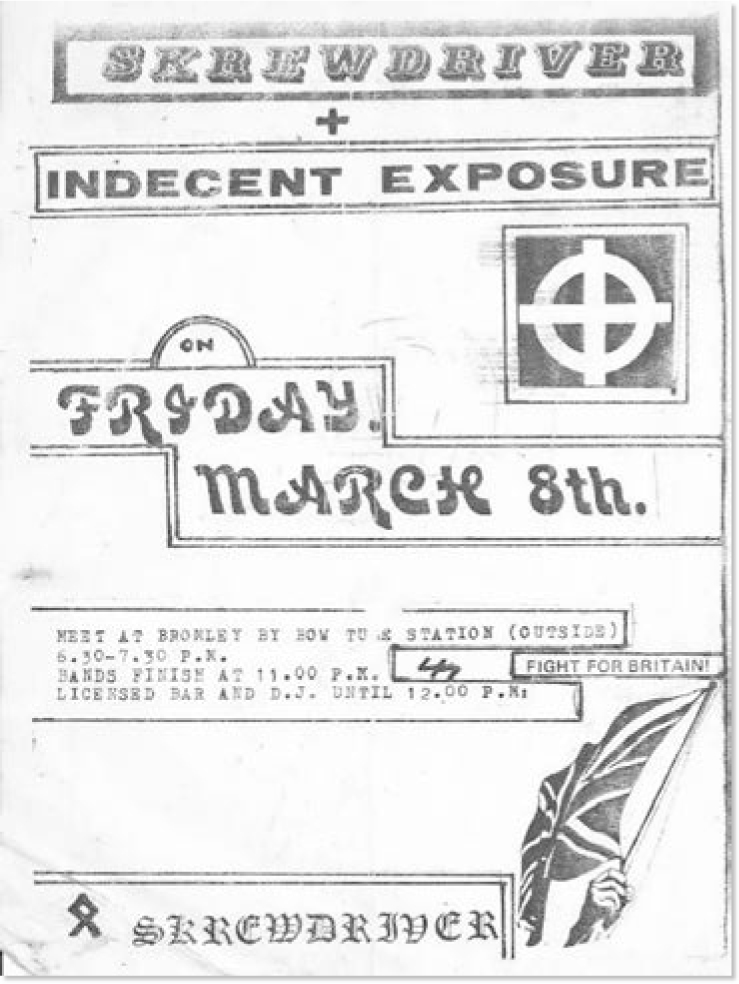

I met and spoke to Ian many times over the coming years and always found him approachable and friendly. One thing in particular I remember about him was that he gave you his full attention when talking to you no matter what was going on around him and he listened very attentively to what you had to say, as if it was very interesting or important. If he saw me at a Skrewdriver gig he always made a point of coming over and having a little chat. I wasn’t a skinhead and it seemed 98% of the audience were. I always thought he made a point of speaking to me to let the skins know I was all right, but perhaps I was reading too much into that.
My first Skrewdriver gig was at a school in East Ham in 1985. Ian Anderson (chairman of the NF at the time) and Joe Pearce were taking the money on the door and helping to arrange the gig. At the time the NF was courting respectability with the voters and condemned nazism. Just before the gig started I was surprised to see Ian Stuart put up a small swastika flag as a backdrop. Just afterwards Anderson got on stage and was talking to Ian, right in front of the swastika flag. At that moment I thought: ‘I hope nobody takes a picture of this and it gets printed in the press because it won’t do the NF any good electorally.’ Thankfully, I never saw any pictures.

David Webster also attended this concert. He had another great night, but little did he know what the future had in store for him. He could never have imagined that he was not to see Skrewdriver perform live again for another 17 months and that the next time he would see Ian would be when they were both serving 12-month sentences in Norfolk’s Wayland Prison.
On Sunday, 21 April, Skrewdriver and Indecent Exposure played the Spotted Bull pub, Apsley, Hemel Hempstead, which was Indecent Exposure’s hometown. A live audience recording of this gig exists. Also, a visiting Canadian television crew filmed ‘a lot of video footage,’ which Steve, Skrewdriver’s Italian bass player, is still looking for.22 This proved to be his last gig with Skrewdriver.
Indecent Exposure also recorded five new songs:33 ‘I Won’t Let My Country Die,’ ‘Authority,’ ‘Stick Together,’ ‘Rocking the Reds’ and ‘What’s the Point’ which were copied and circulated by the band and then released in 1986 with four other songs as the It’s Us V Them tape on their own Index label again.
Milky met Ian Stuart a lot while recording at Mark Sutherland’s studio and said of him: ‘He was quiet off the stage. He never spoke to me about politics and never took the piss. However, he was a totally different person on stage. It was as though he had a stage persona.’ Milky still has in his possession some raw and unmixed versions of material from the ‘Hail the New Dawn’ demo which was recorded straight from the master tape with the permission of Mark Sutherland.

No Surrender — compilation LP
In March 1985, Joe Pearce hired out Mark Sutherland’s studio in East London for one full week to record, engineer and produce material from nationalist bands for the compilation album No Surrender, a White Noise Records and Rock-O-Rama Records collaboration, which was released later that same year by Rock-O-Rama Records (catalogue number RRR 52). All of the material on this comp album was new to vinyl. The front cover artwork, which was first used on a poster by the National Front with the slogan ‘Britain for the British’ and then on the cover of National Front News issue 62 (1985), boldly announces ‘Featuring Skrewdriver and ten other bands.’ It comes as little surprise then that Skrewdriver kick off this album with the first of two well-received contributions, ‘Don’t Let Them Pull You Down.’ It was a call for, as Ian Stuart put it, ‘British Nationalists not to let the establishment tear their flag from them.’ The song also celebrates the recent British victory in the Falklands war over Argentina:
Listen Argentina we smashed you
You should never try it on with the red, white and blue
And if you try again we’re gonna go for your throat
We will rule the waves if we’ve still got the boats
The second Skrewdriver contribution was ‘Tearing Down the Wall’ about the Berlin Wall, which divided Germany. Ian Stuart explained the song as follows:44 ‘The Berlin Wall was built by the Communists to stop people escaping their ‘paradise,’ their ‘workers paradise’! That song was recorded for the album out of respect for our German comrades because we share their belief in a united Germany which can only help strengthen European ties.’
The comp also features Brutal Attack, Public Enemy, the Diehards, New Dawn, Last Orders, Buzzard Bait, Indecent Exposure, Above the Ruins, the Final Sound and Ultima Thule from Sweden. While most bands were in the same musical vein, playing punk or Oi if you prefer, two were not: Above the Ruins played dark postpunk and Final Sound electro-pop. Even though Ian Stuart disliked ‘electronic’ bands, he recognised that different-sounding bands supporting the cause could get the message across to a different audience. Years later he would embrace this train of thought.
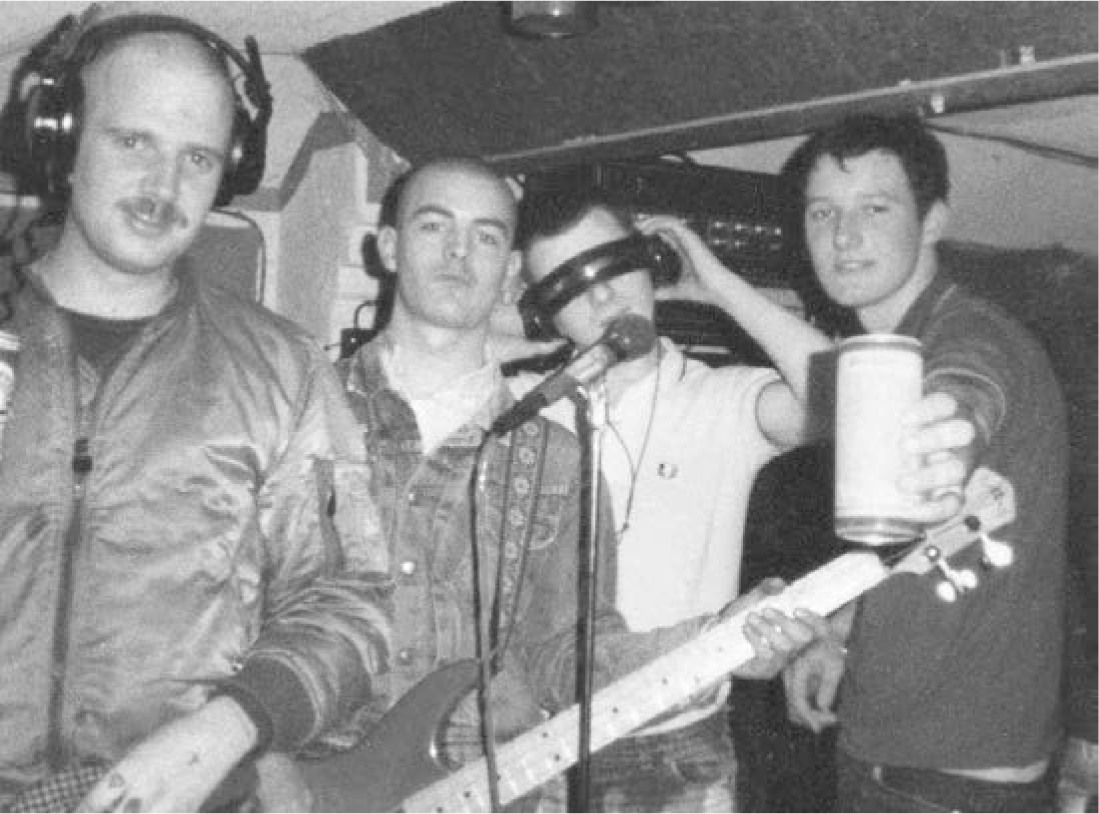
Last Orders recording their contribution for No Surrender Vol. 1
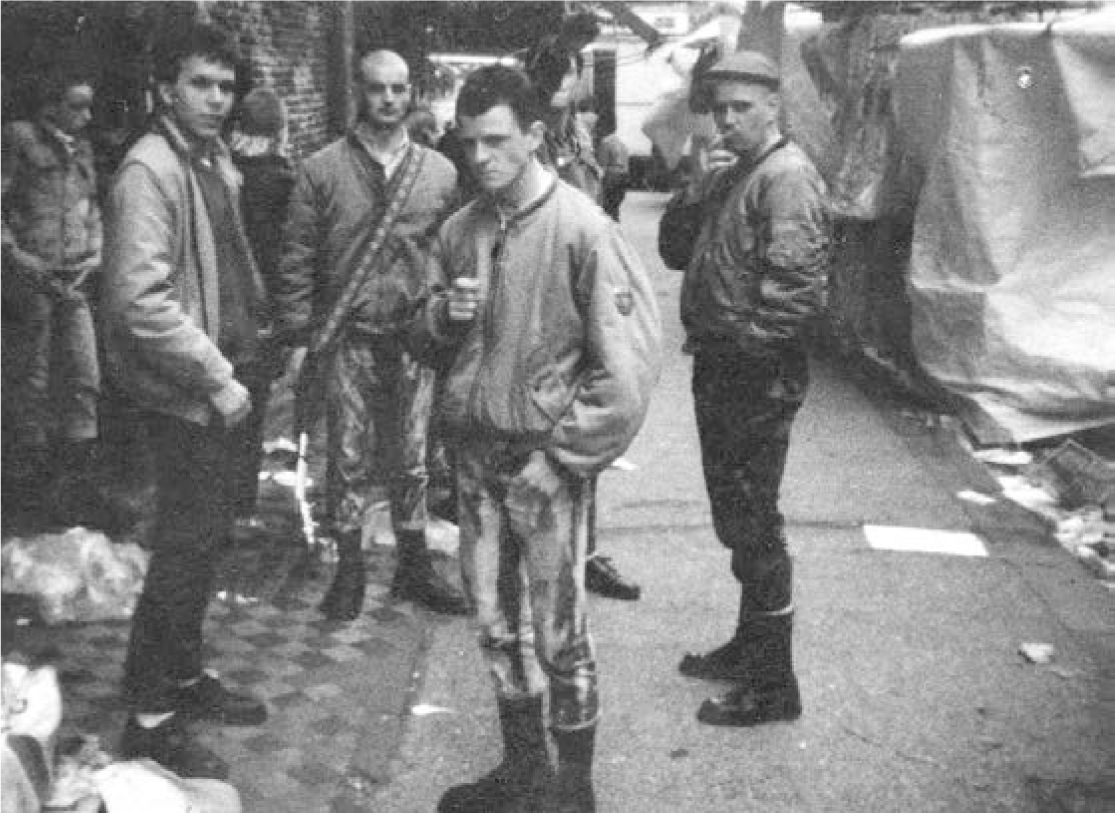
Last Orders outside the Last Resort after recording their contribution
Above the Ruins
Above the Ruins was fronted by NF supporter Tony Wakeford, well-known for his earlier work in Crisis and Death in June. The name Above the Ruins derives from Men Among the Ruins, a book by Julius Evola, an Italian philosopher, fascist and esotericist. Wakeford probably formed Above the Ruins after he was sacked by Death in June in early 1984 for bringing his ‘right-wing leanings into the group.’55 October that same year, Above the Ruins recorded the nine-track ‘Songs of the Wolf’ demo somewhere in ‘East London’ and subsequently released it on cassette, which was available from London-based P.O. box BCM Grimnir and from the National Front bookshop in Croydon, priced £3.75 including postage.
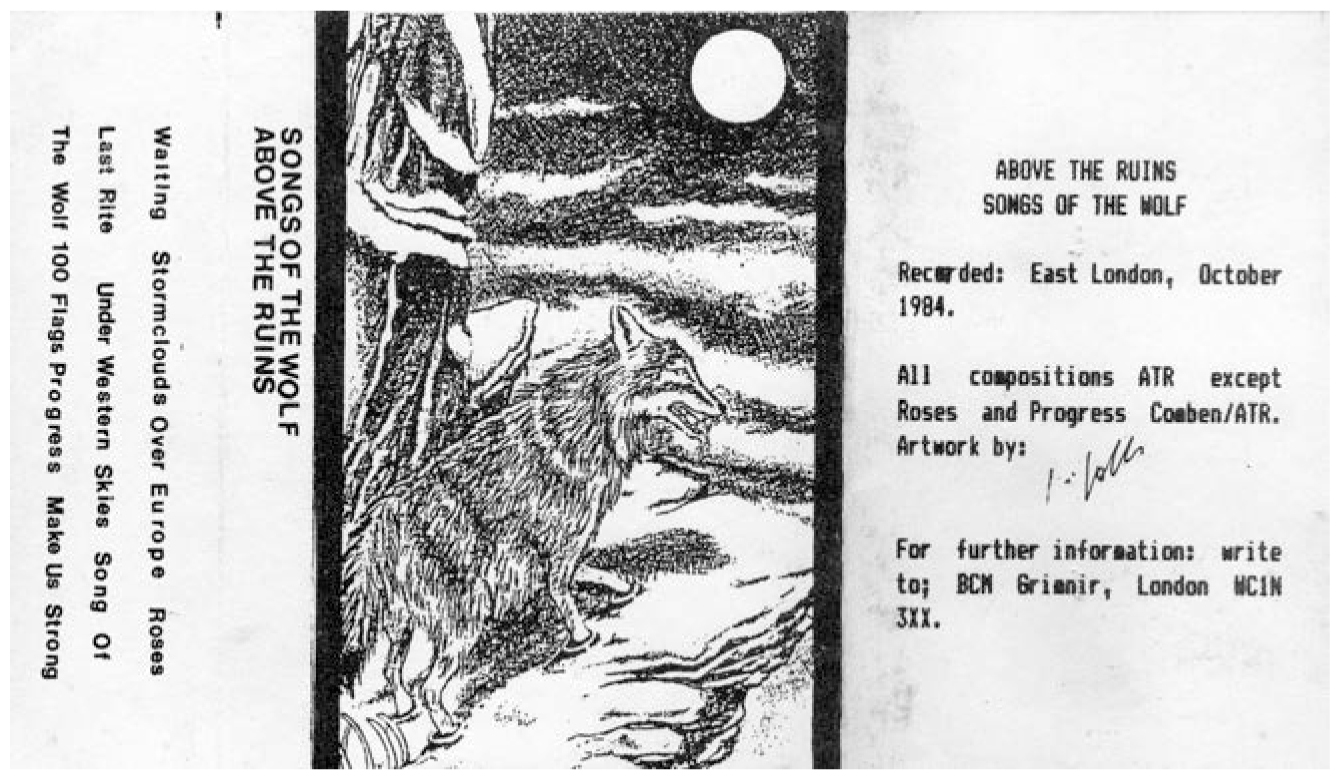
Above the Ruins ‘Songs of the Wolf’ demo tape cover and inlay

Lyrically, the songs penned by Tony Wakeford are less explicit than skinhead nationalist bands, but they do carry some similar messages, denouncing communism, capitalism, liberalism, weakness and ‘Dollar’ Imperialism, and promoting Europe, the ‘Old Gods,’ and strength. The exception is ‘Roses,’ which addresses the grim reality of battlefield death:
My mother likes to think that I died quickly
My father likes to think that I died well
Their telegram had lied, but quite discreetly…
Since I ended up as mincemeat and a smell
For the moment then my mother has her comfort
My father has the strength of his beliefs
Until that is, they come, when all is over
To the crosses that have no one underneath
The demo inlay states: ‘All compositions ATR except Roses and Progress Comben/ATR.’ Very little is known about Paul Comben other than he wrote two booklets of nationalist poetry, 1957, Before the Storm, published by Iona in 1984 with an introduction by Tony Wakeford, and Occupation, published by Capstone in 1987. In his introduction to 1957, Before the Storm, Tony Wakeford started with the following sentence: ‘The volume you are now holding in your hands is the first book to be published by ‘Iona,’ an independent, non-political organisation dedicated to the preservation of our Norse and Celtic heritage.’ The Above the Ruins track ‘Roses’ borrows wholesale from two of Comben’s poems, ‘Roses’ and ‘Crosses,’66 whereas Comben’s words for ‘Progress’ are heavily distorted in places, for example the third verse:
Paul Comben
Mechanised, centralised
Kept to your place
All the same manner
And all the same face
Freedom is freedom
From dissident views
Eyes full of nothing
But authorized news
Above the Ruins
Mongrelised, centralised
Kept to your place
All the same colour
And all the same race
Freedom is freedom
From dissident views
Eyes full of terror
And authorized news
The demo inlay also features a drawing of a phoenix rising from the ashes and four lines of related poetry:
Long it slumbered, but never dead,
Deep in the dark woods, it raises its head
It flexes its wings, the sunlight bleeds,
Risen in the West to set us free.
Remarkably, the demo received a glowing review from Nationalism Today, the National Front journal which rarely ventured outside the ghetto of classical and traditional folk music:77
Above the Ruins are a group of National Front members and supporters whose music is inspired spiritually by the Italian philsopher and Nationalist Julius Evola, and stylistically by groups like New Order and Joy Division. But what of the music on the album? ‘Waiting,’ the opening track on side one, has military drums overlaid by a searing bass and a soaring synthesiser. They all come together to create a cascade of sound which complements completely the idealistic lyrics which talk of the coming renaissance of Europe. This theme is continued with the next track, ‘Storm Clouds Over Europe,’ only this time the voice of Oswald Mosley is overlaid along with the rest of the backing track; Mosley’s voice putting the perfect finishing touches on an atmospherically powerful song. The next track, ‘Roses,’ has lyrics written by Paul Comben who has written articles and poems for Nationalism Today in the past. Paul also wrote the lyrics to ‘Progress’ which is the penultimate track on side two. Paul’s poetic prowess shines through on this track with his savage attack on the modern concept of ‘progress’… However, if ‘Progress’ attacks multi-racialism, the track which precedes it, ‘A Hundred Flags,’ pleads for national sovereignty in the wake of Super-Power oppression… Other tracks on this excellent album include ‘Under Western Skies,’ ‘Song of the Wolf’ and ‘Make Us Strong,’ all of which carry the same messages of rebirth and regeneration for the White nations of the world. The whole album draws heavily from the romantic vision of the Pagan North of Old, and musically it is very professional, drawing heavily on the talents of those who comprise Above the Ruins, a band which consists of people wishing to remain anonymous but have enjoyed success in established bands in the past. Quite simply, Songs of the Wolf is an album which no Nationalist, regardless of his personal musical tastes, should be without.
The following year, Above the Ruins contributed one new track entitled ‘The Killing Zone’ to the No Surrender compilation LP. Plans to release the demo on record were not realised until many years later.88
For years after the event Wakeford denied membership of both the NF and Above the Ruins, which really was the worst-kept secret, but when the weight of evidence became too much he did ‘come out.’ However, speculation about the identity of the other members of Above the Ruins remains rife. Even the likes of Patrick Harrington and Ian Stuart have been named as members of Above the Ruins, but this is most unlikely.99 Patrick Harrington was not well-known for his musical prowess whereas Ian Stuart at that very moment in time wanted to play ‘rock’ music and not dark postpunk! Moreover and importantly, Tony Wakeford, who could play both guitar and bass, had need of a drummer and Ian Stuart was not a drummer in any way, shape or form.
Interestingly, the source for the rumour that Ian Stuart was in Above the Ruins seems to be the interview with Boyd Rice which was broadcast on Race and Reason, an American neo-nazi cable TV show put out by White Aryan Resistance in the mid-’80s. In that interview Boyd Rice stated twice that one guy from Skrewdriver was also in Above the Ruins. The Skrewdriver connection has been confirmed by another source. In the late ’80s one particular stall at London record fairs started to sell RAC records openly and among its wares was the Above the Ruins Songs of the Wolf LP. One customer interested in the album was told by the stall holder that there was a member of Skrewdriver in the band. The stall holder was none other than Des Clarke, a close friend of Ian Stuart and, arguably, somebody in the know. Thus, putting two and two together, it’s possible that Skrewdriver drummer Mark Sutherland played in Above the Ruins. More so, given that Above the Ruins recorded Songs of the Wolf in ‘East London’ where Mark Sutherland had his studio. This really seems too much of a coincidence.
The Final Sound
From Southampton, the Final Sound originally formed in January 1983 out of the ashes of punk band the Grey Wolves. The Final Sound started life with a line-up of Joanne Keal on vocals, James Cross on bass and Steve X on guitar, backing tapes and keyboards. In March 1983, Steve Pearson joined as drummer. Like James and Steve X, he too had played in the Grey Wolves. December 1983 saw Tony Mitchell join the band as keyboard player. He had already played in an all-electronic band called Visual Displays. Over the next two years, the Final Sound suffered a number of line-up changes, too many to mention, leaving just Steve X and Tony Mitchell in the band, both of whom were dedicated nationalists.
Interviewed by magazine New Dawn, the self-proclaimed ‘Revolutionary Voice of British Youth,’ Steve X and Tony Mitchell of the Final Sound had this to say:1010 ‘Ulster — Steve is a staunch Loyalist, and we share the NF’s views on the scum called the IRA. The Tories talk a lot. But when they’re in power, as always, they do nothing. Multi-racialism — recent happenings have proved that people must wake up and realise that we are sitting on a timebomb. Multi-racialism may look glossy on Top of the Pops, but on the backstreets it’s a different story. Nationalism — we would describe ourselves as totally anti-Communist and anti-Socialist as well as being anti-big business. We are Nationalists.’ Despite their various ups and downs, they had stayed true to their nationalist beliefs. When asked about the music business, the Final Sound noted:
The Music biz is a closed shop. Nowadays, it is impossible to get anywhere without being Socialist and into Live Aid. From Simon Bates of Radio 1 to the so-called ‘anti-establishment’ Paul Weller, the whole Biz is trying to get a monopoly on controlling the views of Britain’s youth. They are trying to warp minds into thinking that their views are the only ones. This is why White Noise is such a great thing. It challenges the monster that the Music Business has become.
And it was these two gentlemen who recorded the Final Sound contribution for No Surrender called ‘Genetics.’ Described by New Dawn as a ‘brilliant attack on the evils of multi-racialism,’ the song was written the year before with the following lyrics:
Walking through the ghetto on my way home
I suddenly realised that I’m not alone
Is it the colour of my hair or is it just the clothes I wear?
Why are you following me this late at night?
Black pigmentation, genetic deviation
I’m not surprised that things aren’t said
When their attitudes are so red
In the ghettoes that’s where they lurk
Because multi-racial societies just don’t work
It’s going to end, you know that it’s going to end
The song is strangely alluring and damned catchy, but the chorus of ‘black pigmentation, genetic deviation’ definitely put paid to any thoughts the band might have had of commercial success. There was talk of the Final Sound recording an album with the working title of ‘First and Last,’ but if an album was recorded it was never released.1111 In this way, ‘Genetics’ became the band’s only recorded output. All of their other compositions are now seemingly lost forever, except for ‘The March,’ whose ‘lyrics are dedicated to our superb armed forces who fought in the Falklands’:1212
Don’t you feel so proud
To be one of the crowd
When they walk by
With their heads held high?
Each man would give his life
For his child and wife
And for his whole country
Which includes you and me
And they walk by with their
Heads held high
The Young National Front billed the Final Sound and Above the Ruins in the pages of New Dawn as the ‘new wave of white electronic dance bands,’ proclaiming: ‘But unlike previous ‘new waves’ this new wave of electronic bands won’t herald a new wave of degeneracy and drug abuse. Rising above the ruins of the corrupt capitalist system, this new wave will herald a New Order.’ The YNF planned a concert with Above the Ruins and the Final Sound for the princely sum of £3 per ticket. The author does not know if the concert actually went ahead.
There are some strong tracks on this comp, namely those by Public Enemy, the Diehards and Last Orders, and some which are not so strong. The lyrics to the Diehards track ‘Vengeance,’ in memory of murdered skinhead comrade Peter ‘Geordie’ Mathewson, run as follows:
Avenge the death of one of our warriors
Avenge the death of him today
And that’s why we are gonna stay and fight
to the death tonight
He was in pain was it in vain
For the crime are they gonna pay
Some may say he was insane
Some may say it was in vain
Take revenge is our game
To kill the scum is our aim
Last Orders’ bass player Mark Richardson said of the memorable trip down South to record their contribution, the excellent ‘Just Another Soldier’: ‘We went down in a minibus. Grimsby lads Webbie and Bonehead came with us to sing backing vocals on the chorus. (I couldn’t sing and play at the same time!) Pete’s old man drove us down. We went on the Saturday and stayed with some of his family in Maidstone before recording on the Sunday morning in Bow. Anyway, Saturday night, never been there before, we went out on the piss. We were just coming out of one pub and in walk Public Enemy who unbeknown to us lived there. We greeted each other with a mutual ‘fuckin hell’ and had a bloody great night. The recording studio was in the cellar of a house. The sound guy wasn’t Mark although he was there. We recorded two tracks, ‘Just Another Soldier’ and ‘IRA.’ One went on the compilation LP. So, recording done, with a few hours to kill before going back to Maidstone, we trolled up to the Last Resort and had our photo taken outside.’
The two tracks from Brutal Attack, ‘Take a Better Look’ and ‘Watching the Blood Fall,’ have a demo feel to them. ‘Take a Better Look’ complains about the targeting of skinheads by the police and the abuse of SUS, the stop and search law [repealled in 1981], when ‘there’s a thousand real criminals mugging English old.’ The song then waves the flag for England:
God save Queen and Country
So once again we can run free
Raise our flag, hang it high
With it will fly our English pride
See this is what’s in our hearts, our patriotic stand
We will fight forever to defend our land
In contrast, ‘People of the Lion’ by Buzzard Bait is not good. The reverb on the vocals adds nothing. Not much is known about Buzzard Bait, except that they were from Birmingham and recorded the nine-track ‘White Revolution’ demo in 1985 of primitive, chaotic and noisy punk, which lacks any kind of musical finesse. The band would have almost certainly fallen foul of the Race Relations Act if it had released on vinyl their song ‘Burn a Paki,’ which, on the face of it, incites racial violence.
Swedish band Ultima Thule was surprised by the appearance of one of their compositions on this album. They had sent a demo to White Noise Records the year before and not heard anything until a friend told them that they were on a record called No Surrender. No royalties were ever received.
Milky of Indecent Exposure has a similar story to tell, complaining: ‘We had nothing to do with No Surrender. They went ahead without asking our permission. Our songs are not even proper recordings. We were really angry about our inclusion on that comp and we never received a single penny in royalties.’ This probably explains why ‘Bank Holiday’ is mistakenly titled ‘What’s the Point’ and vice versa. ‘Bank Holiday’ was inspired by one particular bank holiday down Southend as Milky explains:
If you wanted some aggro you went down to Southend the night before. On this particular occasion ten of us from Hemel and Hatfield travelled down in two vehicles, my white van and a car. The Hatfield skins were in the car. We were stopped in traffic in Southend when we got into a row with two cars full of casuals in front of us. Two casuals got out of the second car and approached my van, not realising we had six or seven blokes in the back of the van as well as the Hatfield skins in a car behind me. In an instant the tables were turned. The casuals fled, leaving their second car in the road with the passengers still in it. As the first car sped off we were all over the second car. We smashed the fuck out of it. Swainy put his boot through the back window. Graham was jumping up and down on the roof, which caved in. They definitely got more than they bargained for! On the bank holiday Monday a lot of us were arrested. I said nothing, despite the ‘good cop bad cop’ routine. Because I was the driver I appeared before a magistrates’ court and was sentenced to two weeks in a police cell in Southend. I was locked up for 23 hours a day and only allowed to walk around a small, poxy yard for one hour. Curiously, I was the only one of those arrested whose name did not appear in print.
‘What’s the Point’ was written about people they knew, people into glue-sniffing and taking drugs. Glue and drugs were not tolerated in ‘Milky’s Firm’!
The best compilation albums document a particular scene and a moment in time. No Surrender delivers on both counts, documenting ‘the good, the bad and the ugly’ of an emerging nationalist music scene. Further volumes of No Surrender would follow, but they don’t have the charm and the diversity of the first No Surrender. Joe Pearce was extremely pleased with No Surrender, proving that ‘once and for all, nationalist bands could defy the music establishment and still get their songs on vinyl.’
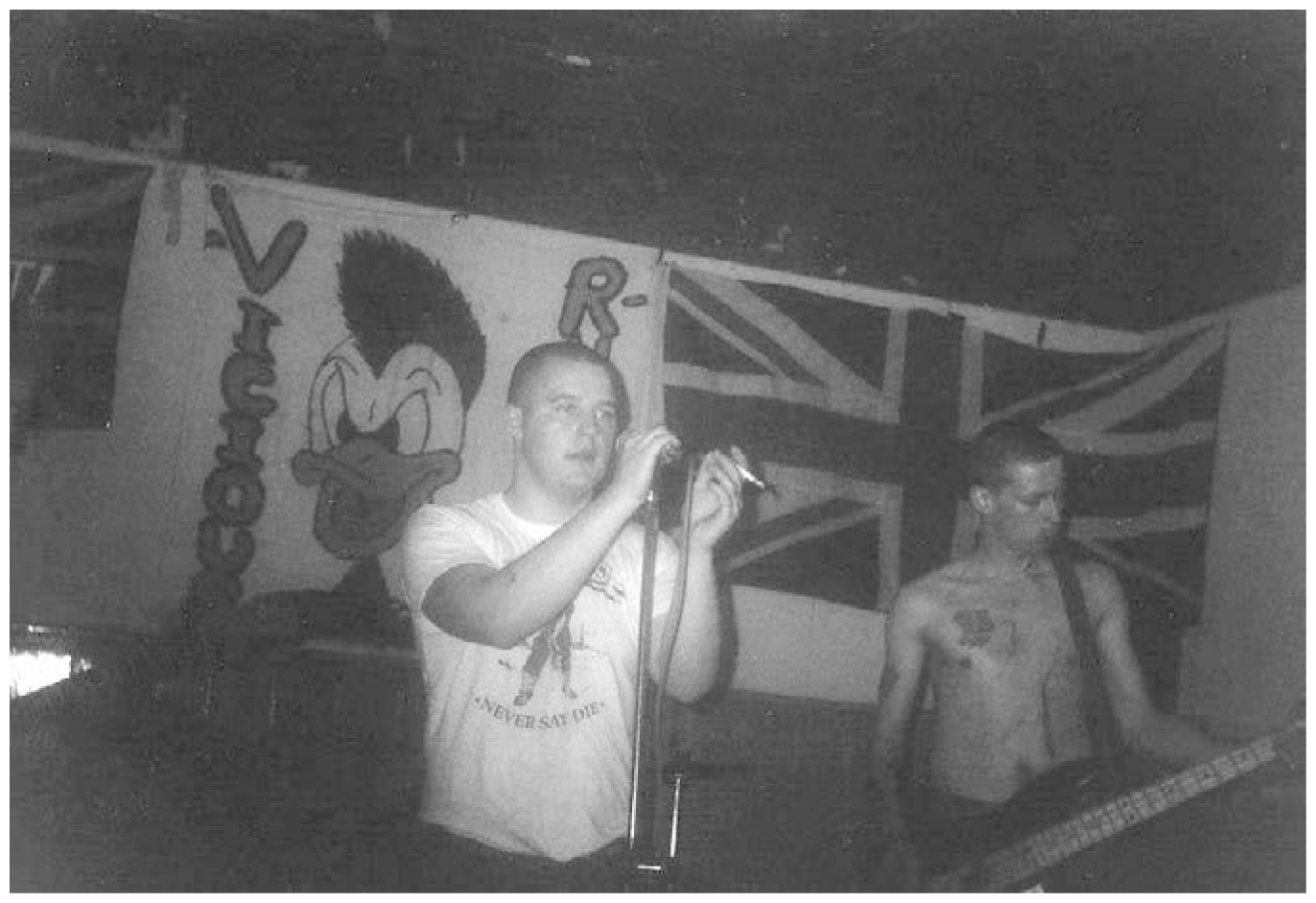
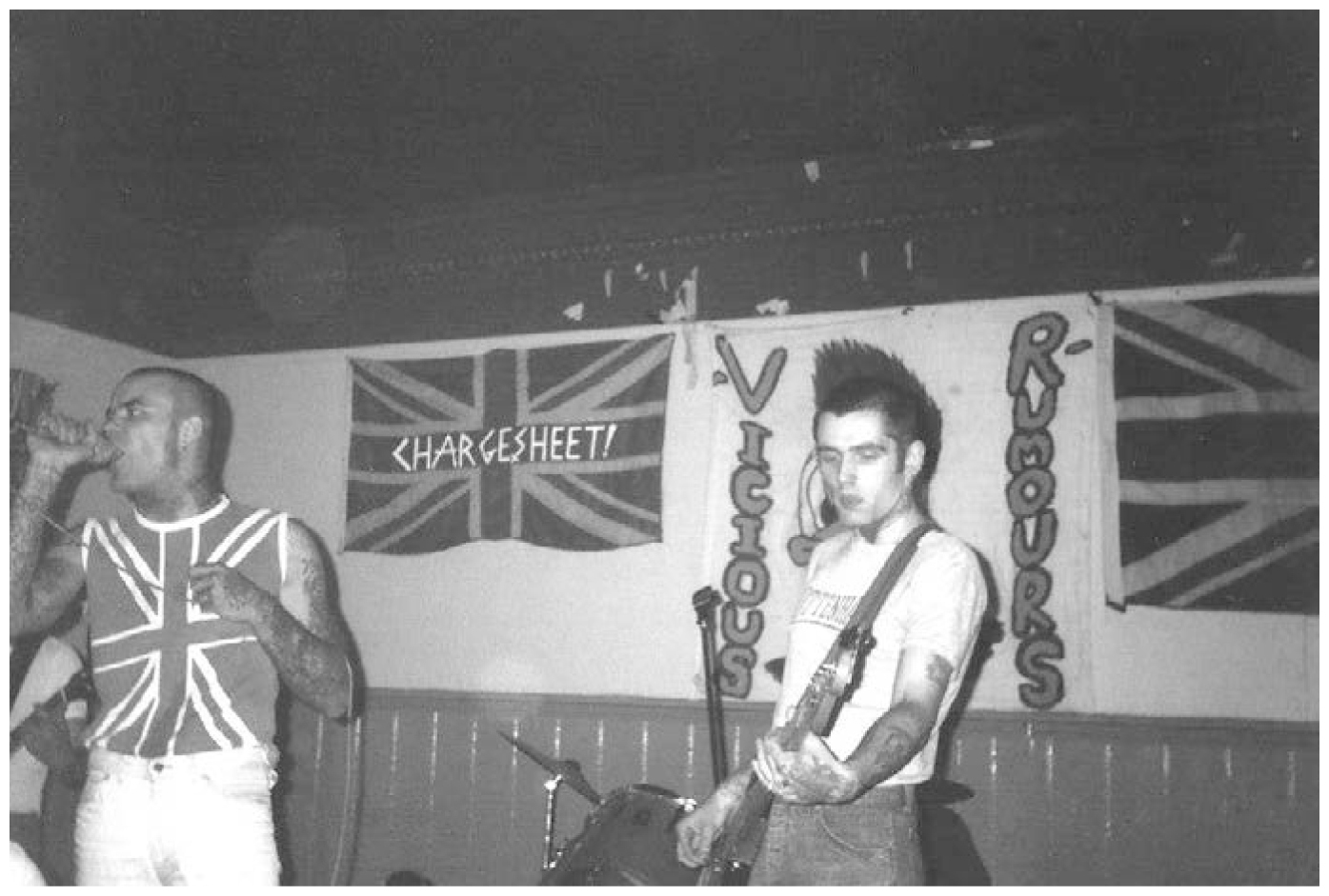
The Diehards and Brutal Attack — Bournemouth 1985 (pictures by Val Drury)
On Saturday, 25 May 1985, Brutal Attack, Vicious Rumours, the Diehards, the Belsen Horrors, and Pride of the Lion played the Pembroke Arms, Bournemouth. The police broke up the concert after it kicked off during Brutal Attack’s set and proceeded to arrest 45 people, including two members of Brutal Attack, Val Drury, Merv Shields, Bear [Skrewdriver Security] and Steve Goodman who produced the RAC-friendly fanzine Chargesheet. Val Drury recalls:
That night I found myself setting in a cell with Angie [Ken’s girlfriend]. On the Sunday the two of us were picked out in an ID parade. Fuck knows how though as we never left the bar where Brutal Attack was playing. On the Monday I went to court, but didn’t get charged. If my memory serves me right I think I got off with it because I had the pictures to prove I was watching Brutal Attack at the time it kicked off. Most got fined but poor Andy [Nunn] went down even though they were playing at the time it kicked off! A great weekend though, but I can think of better places to spend my 16th birthday other than a cell.
Merv Shields, who would later join Skrewdriver, was sentenced to 180 hours community service after pleading guilty to throwing a beer glass at a police inspector. Bear was sent to Bournemouth Crown Court and sentenced to 28 days detention at Her Majesty’s Pleasure. On a lighter note, while banged up, Ken McLellan sang ‘I do like to be beside the seaside’ to keep spirits up!
Skrewdriver now entered the studio to record an album entitled Blood and Honour, as well as two other tracks intended for release as a 7″ single. The Skrewdriver line-up for these recordings was Ian Stuart on vocals, Australian Adam Douglas on guitar, Italian Steve J. Drakos on bass, Paul Swain on guitar and Mark Sutherland on drums. Steve J. Drakos said of recording Blood and Honour:
We recorded all of the songs for that famous album in Mark Sutherland’s East London studio where we also rehearsed. The recording took several days, [filled] with long sessions of hard musical work. To be precise, I started recording the bass lines on 9 June and finished on 25 June. There were a total of five recording sessions. We were very determined in our commitment to the band and to its nationalist ideas, but we also had much fun when playing and rehearsing. There is a set of black-and-white pictures, which can be found on the Internet, we shot with a little automatic camera that we had placed on an amplifier in front of us: in those photos we were supposed to strike serious poses but we could not stop laughing and making jokes about each other. I am not in the line-up on the LP because I had to leave England, and therefore also the band, just after finishing the recording of my bass lines. However, on the album’s first edition you can read: ‘Thanks to Steve A. for playing bass.’
Steve J. Drakos was back in Italy for 28 June. He said of his decision: ‘I had to leave England and Skrewdriver to help my family in northern Italy and to wait for my first son Alex to be born. Today, my son Alex Drakos and I are the Front of Hell, European electronic hardline (www.frontofhell.com).’
On Tuesday, 18 June, Indecent Exposure played the Roxy Roller, Stoke-on-Trent. Milky wanted the Macc Lads to play with them, but it was not to be. Milky has no other recollections of this gig.
On Sunday, 7 July, Indecent Exposure and the Business played the Spotted Ball pub, Apsley, near Hemel Hempstead in Herts. Wearing wigs and Motorhead T-shirts, Indecent Exposure took to the stage. Grabbing hold of the microphone, Milky joked: ‘Indecent Exposure can’t make it tonight. We’ve got a new group called the Headbangers.’ Sedge Swatton regards this gig on ‘home turf’ as his favourite. A decent live audience recording of their performance exists, which also featured cover versions of ‘King of the Jungle’ by the Last Resort and two classics by the 4-Skins, ‘Chaos’ and ‘ACAB.’
On Friday, 26 July, Indecent Exposure and Condemned 84 supported the Business at the Ad Lib Club in Kensington, West London. Ian Stuart and Mike from Feltham were in the audience. Again they got talking. Ian was his usual friendly and chatty self. They talked for ages. It was the last time that Mike saw Ian Stuart at another non-RAC gig, reasoning that ‘he had become too well-known and it wasn’t worth the hassle.’
One night in early August, Ian Stuart, Des Clarke, Adam Douglas and four or five others got into a fight with three blacks at Kings Cross underground station. Cat Valesio was there and recalls:1313
I was seeing Adam Douglas at the time. There was a small group of us, all on our way from the Ferndale to the Aggy — me, Adam, Des, Ian and a couple of others. Just around the corner from Argyll Square was a staircase leading down to a subway that crossed the road outside Kings Cross underground station and also led to the station ticket office area. We were walking towards the station and three blacks came walking towards us. As they approached us they started shouting things out, mainly at Des. I can’t remember who struck the first blow, but the blacks were the aggressors. There was a bit of a fight and we all ran off when it was finished. We all met up again at the hotel where I think the police came and arrested Des and Ian. They were also looking for Adam too but were unable to find him. He was worried the police had a warrant out on him and this was one of the main reasons he left England to join the French Foreign Legion. Only Ian and Des were nicked. I wasn’t even questioned as a witness. After Adam joined the Legion I went back to Italy for a while but couldn’t stand it for long and soon returned to London.
Ian Stuart later said of his arrest:1414 ‘The police said to us at the station that they had arrested us because if they had arrested the blacks, they would have had the race relations people, left-wing lawyers and politicians, as well as all manner of left-wing scum screaming at them. If they arrested us, there would be no such opposition.’ Ian Stuart and Des Clarke of Skrewdriver Security were subsequently charged with violent disorder. They awaited their trial. Convinced that he was going to be sent down, Ian Stuart asked Cat to stay in his room at 41 Argyll Square and look after his belongings while he was away.
On Saturday, 17 August, Indecent Exposure and the Diehards played a Rock Against Communism festival near Lübeck, Germany, headlined by German skinhead band Böhse Onkelz. Over seven hundred skinheads attended the festival.1515 Milky said of this particular outing: ‘It was absolutely brillant. We were the first ever English Oi band to set foot in Europe, yet alone Germany. The Diehards were awful and, yet, I think it was us who asked them to go. The Germans watched stony-faced. At one point the singer of the Diehards shouted: “Dance you bastards.” It was embarrassing to be associated with them.’ Indecent Exposure later released a decent live recording of their performance on their own Index Tapes.
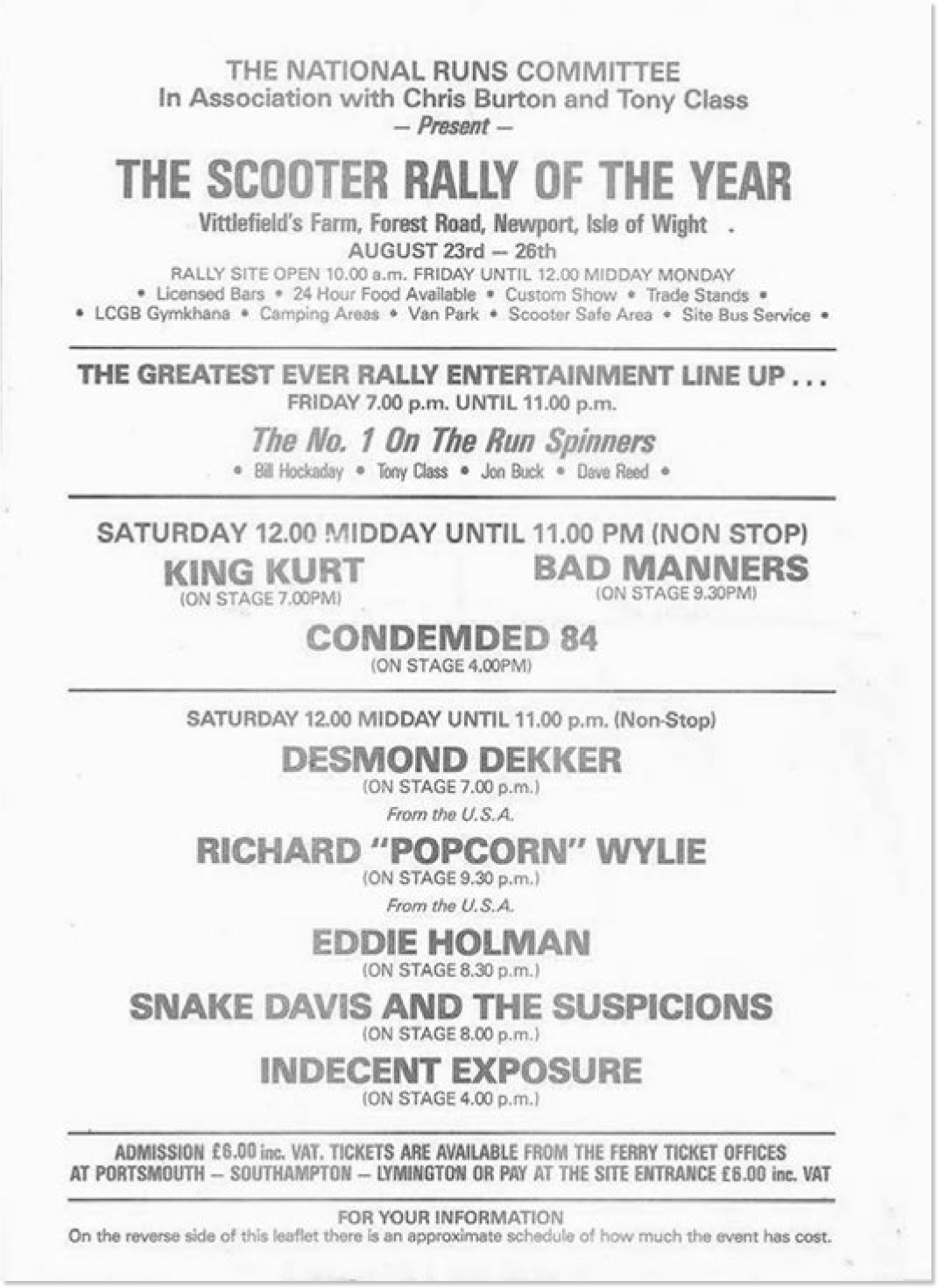
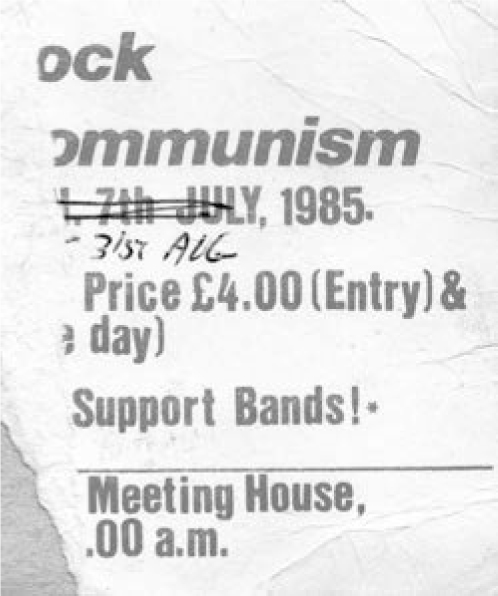
Flyers exist announcing Sunday 7 July as the date of the RAC Summer Festival with Skrewdriver and five support bands. However, the festival took place on Saturday 31 August. The concert ticket (right) with the original and revised date. The author does not know why the festival was postponed from the original date of 7 July. Coaches travelled to the festival from Friends Meeting House opposite Euston Station.
Indecent Exposure then played the Isle of Wight Scooter Run, which was held over the bank holiday weekend of 23–26 August. Index played on Saturday, 24 August.
On Saturday, 31 August, Skrewdriver headlined the RAC festival in Suffolk. Support came from Brutal Attack, Indecent Exposure, Public Enemy, the Diehards, Last Orders, Prime Suspects, New Dawn and Society’s Rejects from Belfast.
Sid from Birmingham attended the festival, which was his first live experience of RAC. He said of his pathway to the right side:
I was born in 1964 and grew up in a suburb of north Birmingham called Erdington. From a white working-class background, I became politically minded in my teens, regularly reading National Front and British Movement literature. I started listening to punk around 1978 because it was rebellious, working-class and I could relate to it. I was into the Pistols, the Clash, the Ruts, and the Angelic Upstarts. I saw the Upstarts at Digbeth Civic Hall in Birmingham in 1979. Yes, I was proud to be a Brummie skin. Back then Birmingham had a large skinhead following, in fact one of the biggest in the country, and most were NF, as well as supporters of the Blues [Birmingham City Football Club]. I became aware of the nationalist/RAC scene through the Young National Front in the ’80s which had launched the White Noise Club. It was the right-wing political views of the bands that attracted me to that scene. They sang about issues which concerned me and they had the courage to tell the truth, whereas all the other earlier punk bands I had been listening to were left-wing and had jumped on the Rock Against Racism bandwagon. The first RAC gig I went to was at the farm in Suffolk in 1985. A coachload of us from the Birmingham Young National Front travelled down to the gig. It was great! I was well impressed with the reactions the bands got from the crowd, especially Skrewdriver.
Years later, Sid would join a nationalist skinhead band. The name of the band was Razor’s Edge.
On the same coach chartered by the Birmingham NF/YNF was Mark from Coventry. Like Sid, this was his first time of seeing Skrewdriver. This is his story:
Back in about 1981–82, whilst in my third year of comprehensive school (aged about 14) I was a huge fan of Madness and Bad Manners (not the 2 Tone, race-mixing rubbish of the Specials etc. — even though they were from Coventry), and so had a crew-cut and wore a Crombie and eight-hole Doc Martens etc. A school friend came up to me one day at school and asked me that since I dressed like a skinhead, did I like the Angelic Upstarts, Sham 69 and the Cockney Rejects. I said I wasn’t familiar with them and asked how do I get to hear them? He lent me an album by each of them, and although it took me a few plays, I began to like them and was hungry to find out other similar bands. I began hanging around with a group of skins in the city centre on Saturday afternoons who were a couple of years or so older than me, and who’d been around on the scene for a while. One of them asked me if I’d heard of Skrewdriver. No was my answer. I borrowed his ‘Back With a Bang’ 12″ single, and listened to the White Power EP etc, and was hooked. Skrewdriver were not only passionate, proactive and playing my sort of music, they were singing about the same things I believed in. I was hooked.
Around that same time, a friend of mine who was deeply political and actively so, was telling me things about the country, the system and its adherents, and world views on current affairs. It all started to make some sense, and so rather than just take what he said at face value, I began to bounce off other people (adults/family etc.) as well as read books and listen to the many arguments (again, we only form our own views by learning from others and finding out for ourselves) and decided that since I’d held similar views on things like immigration and cultural issues, it was the path that I was obviously meant to be on. Connecting the dots up, that’s where it all started.
I believe the RAC festival in 1985 was my first time of seeing Skrewdriver. I got on the coach with all the Coventry lot and the Brummie YNF lads. I recall being daunted by the occasion of being among several hundred skins for the first time, especially as I’d heard so much about the legendary Skrewdriver Security, etc. I’d just started doing my skinzine and was hungry for experiences and info to write about. At that time, I was a fresh-faced 16-year-old who’d not been to any/many gigs and who’d ventured little more than the edges of Coventry. We only learn things by putting ourselves out there to learn.
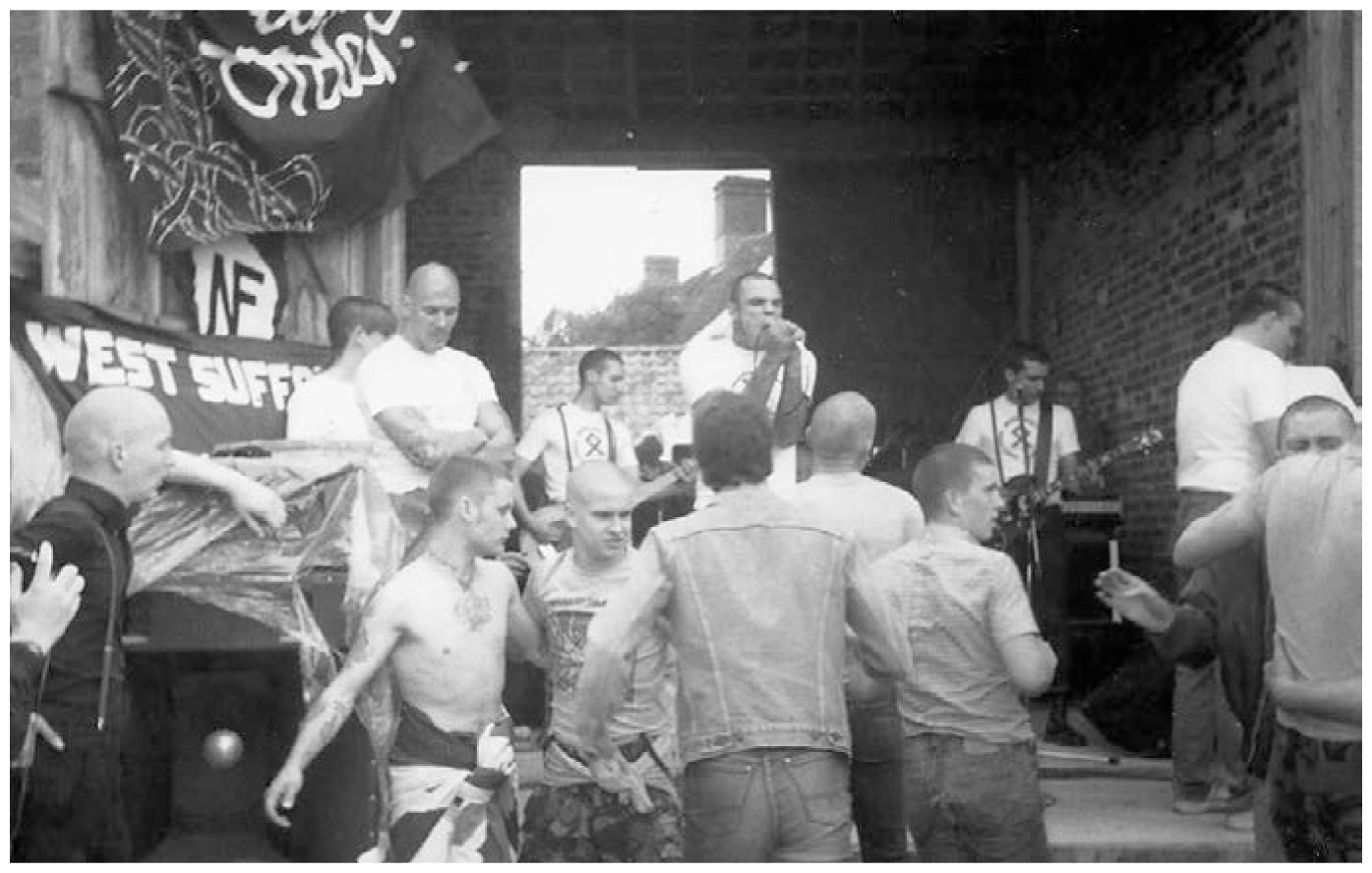
Brutal Attack at Suffolk
Mark Richardson of Last Orders has a very special memento of the festival: ‘Just before we went on my bass strap snapped, Ian Stuart gave me one of his, which I still have to this day.’
Milky of Indecent Exposure has altogther different memories of the day:1616 ‘We were billed to play before Skrewdriver. Brutal Attack went mad. They were dropped down below us and when they played they would not come off the stage. It bothered me big-time because I thought Ken McLellan was taking the piss. I later confronted him and he was all apologetic.’ This was not the first time Milky and Ken McLellan had crossed swords. Milky again: ‘I received this letter from Ken calling us country bumpkins and the like. He could not have been more wrong because I grew up in Bethnal Green, East London, attending Daneford Boys School. I wrote back to Ken, politely setting him straight. He wrote me a letter of apology, which I gave to Steve Farr and he printed it in his fanzine, Punishment Block. His fanzine liked us. We were both from Herts.’
On Friday, 13 September, Brutal Attack and the Diehards played the Ad Lib Club, Kensington West London.
On Saturday, 14 September, Indecent Exposure, Public Enemy and Section 5 played the Ad Lib Club, Kensington, West London. Skrewdriver turned up out of the blue and did three songs: ‘White Power,’ ‘Streetfight’ and ‘Smash the I.R.A.’1717 Milky was not particularly bothered by this turn of events.
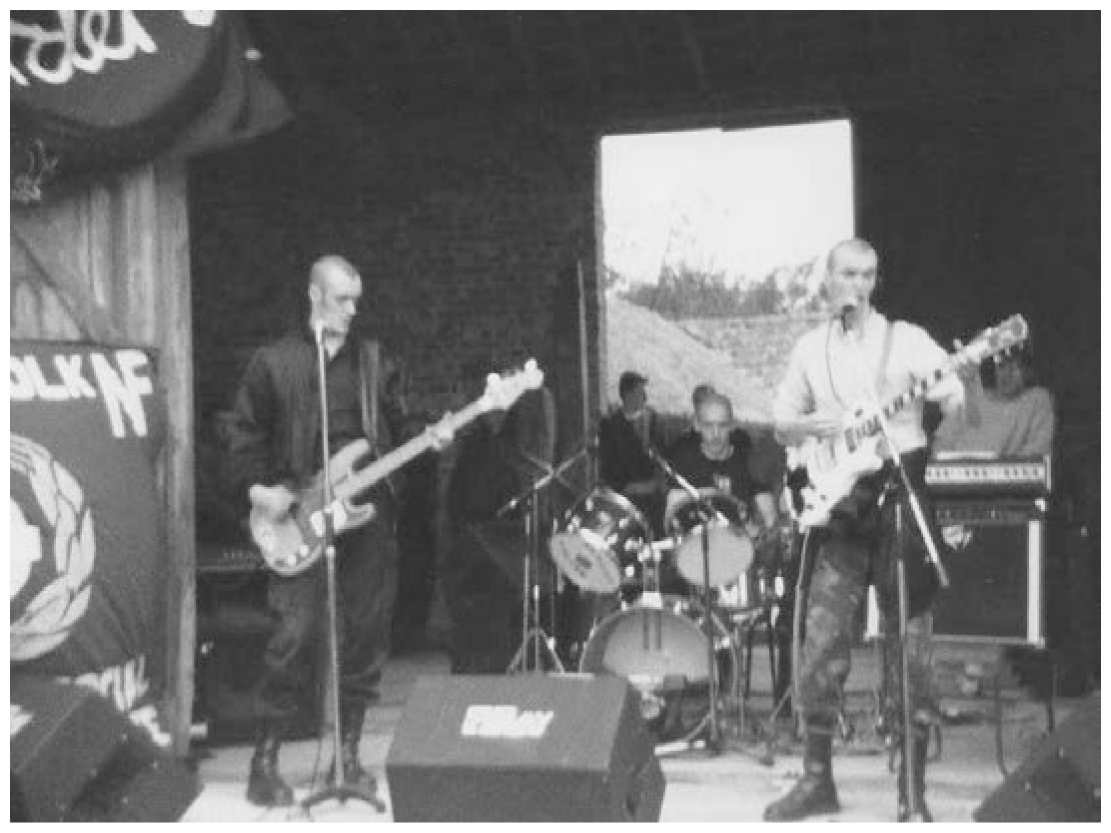
Society’s Rejects — Summer RAC Festival 1985, Suffolk
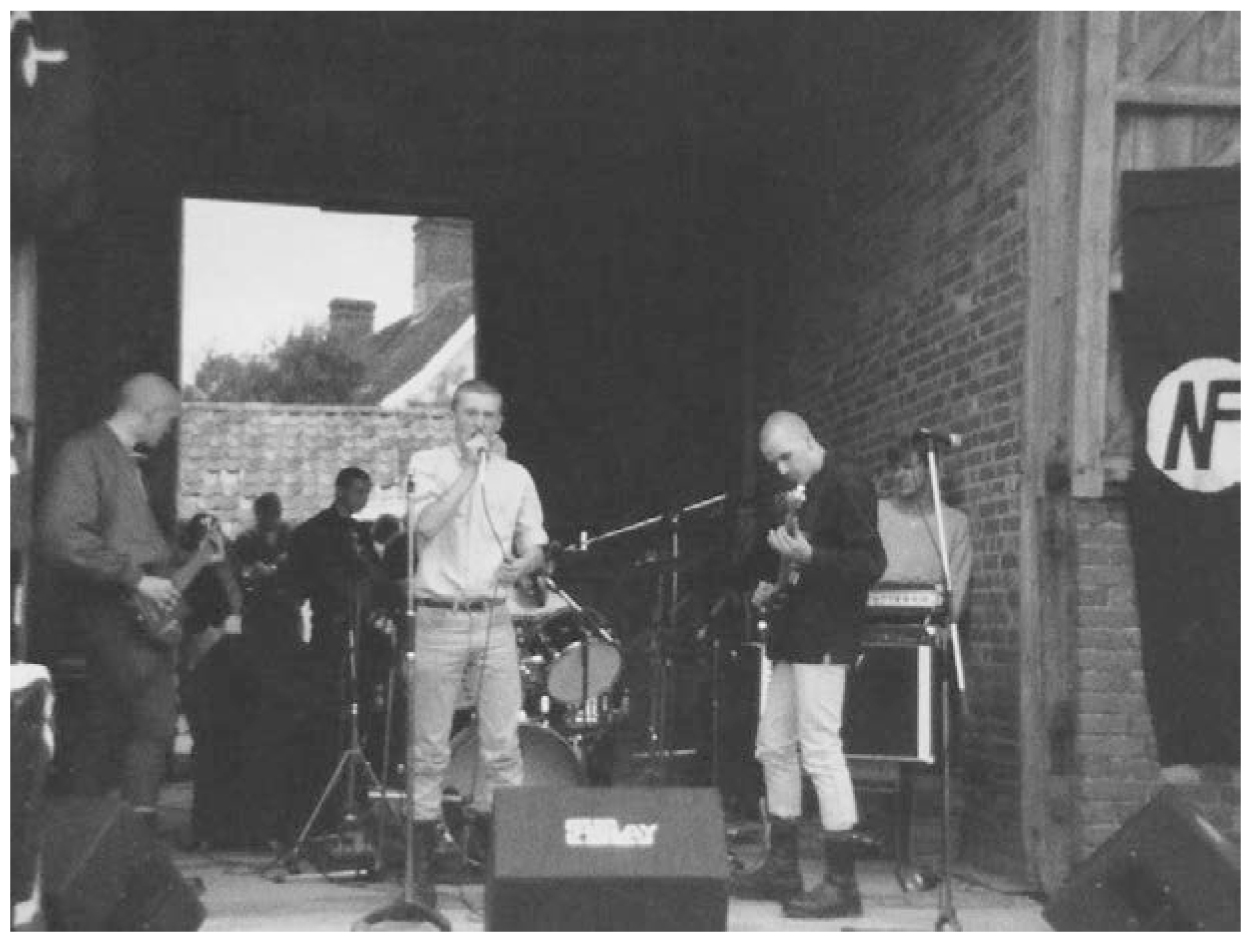
New Dawn — Summer RAC Festival 1985, Suffolk
On Sunday, 29 September, the Business with support from Indecent Exposure, Vicious Rumours and Public Enemy played the Savoy Ballroom, Tufnell Park, North London.1818 A live audience recording of all three support acts exists. Words were exchanged between Milky and some political skins before he went on stage: ‘I was approached by Nicky Crane, Adolf, and Peter Crain, who they called New Zealand Pete, in the toilets, of all places. New Zealand Pete did all the talking. He said: ‘You’re our band. You’re playing for us.’ Meaning we are an NF band. I replied: ‘Hold up a minute, let me set you straight. We are no one’s band. We play to who we want, when we want.’ He finished: ‘Okay, have it your way.’ They left. I was not concerned, but I did mention it to the boys before we played.’
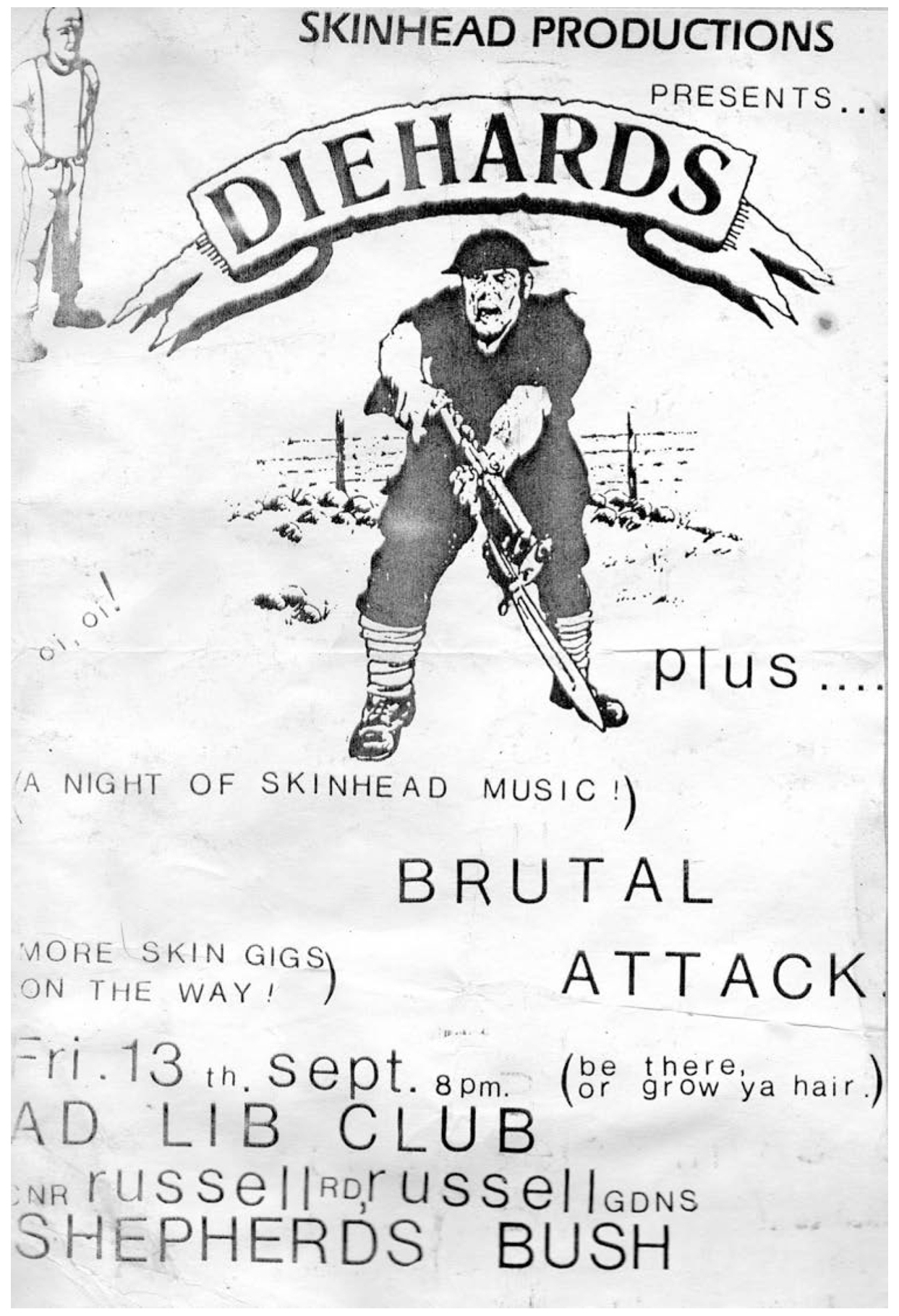

When Indecent Exposure played a bottle was thrown from the audience, which hit Milky, splitting his head wide open. Wiping blood from his head, he soldiered on and finished the set. He was surprised when his sister got up on stage, grabbed the microphone and shouted: ‘Who fucking done that, you fucking wankers?’ After the set, the band jumped into the crowd looking for the fucking wankers responsible. They had slipped away quietly. Milky would require 12 stitches to close the wound to his head. The band is still convinced that the ‘bottle incident’ was connected to the earlier exchange of words between Milky and the political skins. There has been great debate about who threw the bottle, but the name of Alan Pond, nicknamed Adolf, is often mentioned. After this concert, Indecent Exposure said: ‘Fuck London.’
On Thursday, 3 October, Indecent Exposure supported the UK Subs at Bogiez in Cardiff which was organised by Roddy Moreno.1919
On Saturday, 16 November, Brutal Attack, the Diehards and ‘Belson Horrors’ played the King William IV pub in Greenwich, South East London. [Billed to play, the Belsen Horrors may have already broken up.]
On Tuesday, 17 December, Indecent Exposure played the Spotted Bull in Apsley with German skinhead band Böhse Onkelz.
On Thursday, 19 December, the Business, Condemned 84 and Indecent Exposure played the Hand & Heart in Coventry.2020 Organised by Mark of Voice of Britain fanzine, he has no specific memories of the gig other than the fact the shop next door to the pub, a military surplus store, had their windows smashed after the gig.2121
Indecent Exposure played more gigs that December. They played Bogiez in Cardiff again with the Business and Vicious Rumours, which was organised by Roddy Moreno again.2222 There was a big fight.
Soon after, the band decided to take a hiatus from playing live. For Indecent Exposure, 1985 had proved a rollercoaster of a year filled with highs, playing in Holland and Germany, and lows, the Savoy Ballroom in particular. They would not start playing again until February 1987 and never again would they play under the umbrella of Rock Against Communism.2323
Last Orders
Bass player Mark Richardson reflects on what might have been:
Well on the back of RAC ’84 and the gig at Tiffany’s, 1985 should have been a good year for us and it started out that way with us supporting the Toy Dolls in February and the recording for the No Surrender LP in April. Then Pete left not long after the recording. I don’t remember why he left, but it wasn’t the same. To be honest we should have called it a day then. We tried recruiting a new singer but there weren’t many people about who wanted to sing nationalist songs so we carried on with Craig doing guitar and vocals. He did his best but didn’t have that edge that Pete had. We did practice every couple of weeks but there was no enthusiasm to play live. Then we got the call to play Suffolk again. We said yes and were sent eight tickets, four band passes and four guest tickets. Now, do we tell Joe Pearce that we are only a three-piece now? Nah fuck it, he won’t say owt. Anyway, we agreed to do it for our petrol money home so we never mentioned it. So we hired a van and made our way the night before. About ten of us all in! Pete took a van as well so there was around 20 from Grimsby at the gig. We kipped overnight somewhere past Norwich and next morning started off for the venue. Hang about sez Gaz, we’re out of beer! We’re driving in the middle of nowhere at this point so head for the nearest town/village to get stocked up. So we pull up opposite this orange VW camper that had just stopped. We get out, then Ken from Brutal gets out of the VW; looks like we’ve all got the same idea. We have a bit of banter, then head off for the venue. So to the gig: we were on early and there wasn’t many in at this point. Had a few minutes to tune up before we went on. Then Joe comes up just before we go on and Craig brings up the petrol money. You’re not gettin owt, he says, you’re only a three-piece now so you’ve had two extra tickets. The twat, we thought. Anyway we went on. And the sound was shit, all I could hear was the drums, bass and Craig’s vocals, couldn’t hear his guitar at all, didn’t matter where I stood on stage, must have sounded terrible. Anyway halfway through the set Pete got on stage and did a few songs with us, just like old times. I bumped into Joe Pearce after we’d done our set and shouted over: Hey Joe, we’re a four-piece again. He laughed, put his hand in his pocket and handed over the petrol money. To be honest I think he would have given it to us anyway; he was just winding us up cos of the two tickets. I got the chance to have a quick chat with Darren Mumford from Public Enemy before they went on. Some of the songs we played were ‘Just Another Soldier,’ ‘IRA,’ ‘Maximum Security,’ ‘Scum’ and ‘Future Shock.’ We always started local gigs off with a cover of the 4-Skins’ ‘The Spy From Alaska,’ but don’t think we played that at ’85. At the end of RAC ’85 we was clearing up, taking down our backdrop and flags, I was just reaching for one of our union flags when I heard someone behind me say something on the lines of ‘what’s your game?’ I turned round and Nicky Crane is stood behind me. I sez, taking our flag. He sez, it’s not yours, it’s ours. Well it’s a well-made hand-stitched flag and I wasn’t going to back down. So I sez OK, you take it down and look at the writing on the side of it. So he reached up, took it down and had a look. I said, there on the side Nicky, it’s the name of the fuckin trawler it was pinched from. It could have gone either way knowing him, but he just grinned and handed it over…
By 1986 band practices were just becoming excuses for a piss-up so I just stopped going to them. Besides Gaz and Craig were going in a different musical direction. We probably could have gone further if Pete had stayed.
Last Orders played no more than 15 gigs. The best gig they ever did, in the opinion of Pete, was Cleethorpes Winter Gardens, February 1985 supporting the Toy Dolls. He recalls of that night: ‘We had about a 12-song set and everything went fine, not one mistake or a note out of place. The hall held about two hundred or three hundred kids from Humberside and the Midlands. I recognized about 20 faces. We went onto the stage, started an intro and there were piles of bodies dancing. At the end of the night people were nicking song sheets and asking for autographs. We all just laughed and told them to fuck off.’
Most of the lyrics were patriotic and nationalist. The band supported the National Front, in which ‘they found an answer and a purpose.’ The band’s best-known number, which also featured on the No Surrender comp LP, was ‘Just Another Soldier,’ written by Gary and lyrically reminiscent of ‘Last Night Another Soldier’ by the Angelic Upstarts:
Mindless yob he had no brain
Joined the Army he was insane
Got sent to Ireland with a gun
Soon he found it wasn’t fun
A-Bomb blows up in Belfast
Ten men dead it was that fast
The I.R.A. don’t give a fuck
Just plant the bombs that blow you up
Life in Ireland’s getting tough
No life there it is too tough
One of these days they’re gonna get you
You’ll end up dead like the rest of them do!
Joining the Army ain’t much fun
Getting sent to Ireland with a gun
You’ll get a bullet through your head
You’re just another soldier. Dead!
Last Orders released a ‘cassette single’ of ‘Just Another Soldier’ and ‘IRA,’ the two tracks it had recorded in Bow, although they were not happy how it came out. Mark Richardson thinks the cassette was called ‘These Are Your Last Orders.’ They never recorded in a studio again or released any other material. After leaving Last Orders, Pete formed a new band called Backlash.
Asked how he would like Last Orders to be remembered, Mark Richardson replied: ‘I’d like Last Orders to be remembered just for being part of it all. No excuses, we knew what we were getting into. I was a nationalist then and am a nationalist now. We weren’t a great band and we were never going to be. Just sharing a stage with Skrewdriver was enough for me.’
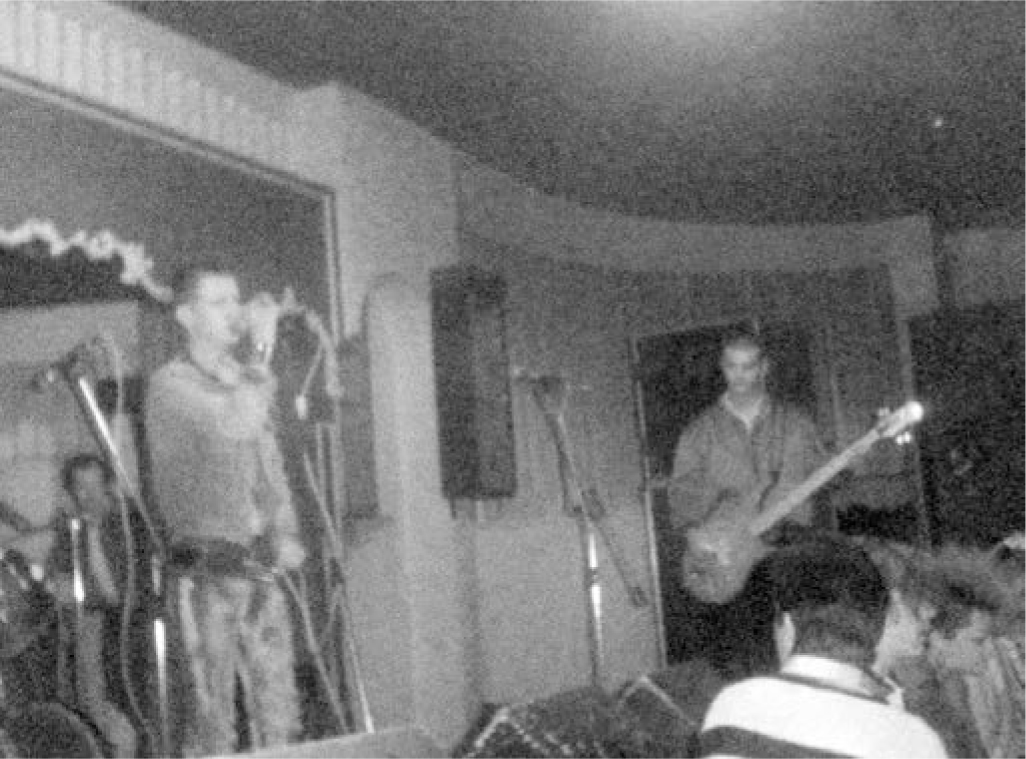
Last Orders, Cleethorpes Winter Gardens, February 1985
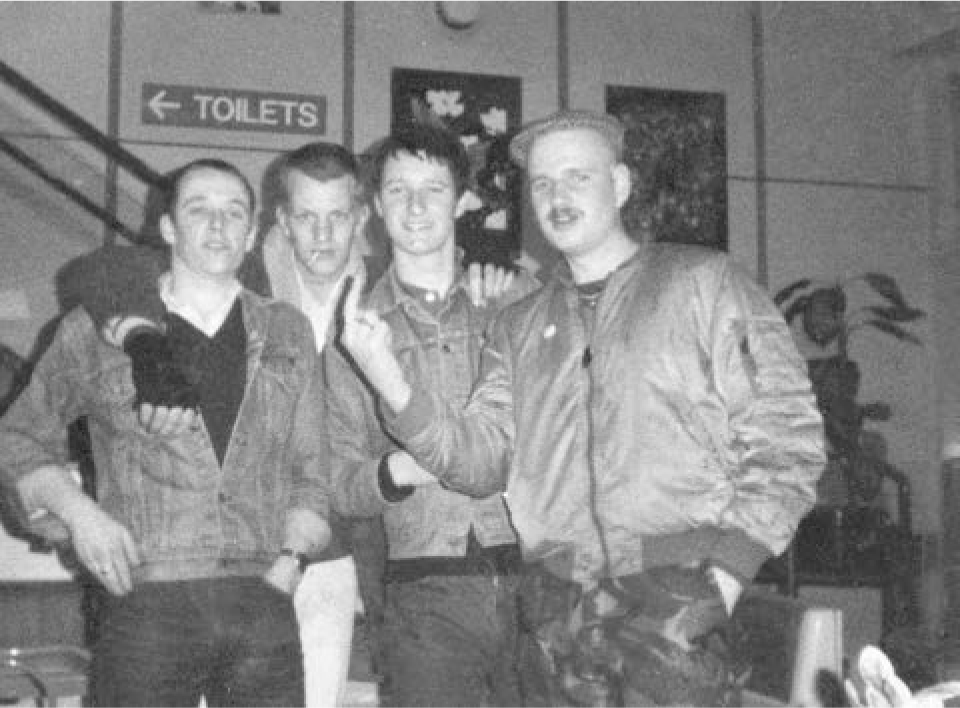
Last Orders and Public Enemy, a quiet night out in Maidstone 1985
From the Shankill area of Belfast, Society’s Rejects was formed in March 1984 by bass player Jim ‘Bimbo’ Robinson and drummer Steve Crowe. They recruited Lee Martin on guitar and Tony Harrison on vocals. All were skinheads. They sung about the ‘troubles in Ireland and the National Front.’ Politically, they were loyalists who wanted ‘to scrap the Anglo-Irish Agreement and keep Ulster British.’ Their most popular songs were ‘Peace Line’ and ‘Let’s Fuck.’ They played no more than ten gigs before they broke up in late 1986. They enjoyed playing the 1985 Summer R.A.C. festival but their favourite gig was in the Shankill Community Centre on 1 April 1986. The band never recorded, not even a demo.
All was not well between Ian Stuart and the NF. One week before his trial, Ian Stuart and his good friend Charlie Sargent went to the Blitz Club. Harrington and two NF minders approached them and started to have a go at Ian Stuart. Charlie Sargent pulled a knife on them. They quickly backed off.
On 11 December, Ian Stuart and Des Clarke of Skrewdriver Security were brought to trial. Charlie Sargent was removed from the court for trying to intimidate the jury. The proceedings became something of a farce. According to Ian Stuart, ‘The blacks didn’t even turn up at court for three days in a row and the police had to go out and bring them to the court.’ The defence argued that left-wing activists had been leafleting the local area around Kings Cross and in this way Ian Stuart had become a marked man. The judge, however, was having none of it. He told the defendants that ‘they must have started it because they were NF.’2525 Both Ian Stuart and his co-defendant were found guilty. Ian Stuart was sentenced to prison for 12 months.
Imprisoned at Wormwood Scrubs, Ian Stuart was delighted to meet Joe Pearce, who had fallen foul of the justice system for a second time. They had worked together on a number of NF projects. His ‘crime,’ as Pearce described it, was ‘daring to report accounts of black attacks’ in Bulldog, the paper of the Young National Front.
Belatedly, National Front News covered the imprisonment of Ian Stuart under the heading ‘Rough Justice’:2626
Ian Stuart, NF Central London Branch organiser and vocalist with the racialist rock band Skrewdriver, received a 12 months prison sentence in December for defending himself from a racial attack. Ian and a group of NF members were attacked at Kings Cross tube station by an immigrant gang. While Ian was unjustly convicted of assault, none of the blacks, who started the trouble, were even charged. Despite the fact that Ian had no previous convictions, he received a savage 12 months jail sentence. Another NF member, Dessie Clark, received a 9-month sentence.
This small article in NF News was not much to someone whose case the NF had promised to make high profile.
Skrewdriver — Blood and Honour LP
In December, one week after Ian Stuart’s incarceration, the Skrewdriver Blood and Honour LP (catalogue number Rock-O-Rama 53) was released. The inspiration for the album title came from the 1982 German-American TV miniseries Blood and Honour: Youth Under Hitler (Blut und Ehre: Jugend Unter Hitler in German), a copy of which Ian Stuart had on video. The miniseries portrays the growing conflict between a fast-rising member of the Hitler Youth and his resolutely anti-Nazi parents. The Hitler Youth was the Nazi Party’s Youth Movement. Blut und Ehre (Blood and Honour) was engraved on the Hitler Youth dagger and appears on many designs of Hitler Youth belt buckle. Again there was no mistaking the political ideals of Ian Stuart, those of National Socialism.
Generally speaking, Blood and Honour stands head and shoulders above Hail the New Dawn. The front cover, depicting a scantily clad Nordic warrior holding a double-headed axe dripping with blood against the backdrop of a barren but beautiful coastline, which was designed by Bugs Tattoo Parlour along Caledonian Road, North London, is a vast improvement on the front cover of Hail the New Dawn; Nicky Crane was many things, but an artist he was not. The production by Mark Sutherland, the band’s drummer, was better. The melodies were stronger. Indeed, according to Ian Stuart when interviewed in 1986:2727 ‘I like it. Personally, I think it’s the best thing we’ve done. It’s heavier and better produced than anything we’ve done before. The tunes on the album are more intricate, not so basic, though the music is still raw and powerful which is the way I like the band to be. There’s more to the tunes, more to the lyrics and better musicianship.’
This time the musical influences from the world of classic heavy metal and rock were far more dominant. Arguably, Skrewdriver were still far removed from emulating Ian Stuart’s rock and heavy metal icons AC/DC, Manowar and Jethro Tull. Many of the songs are slower and heavier. In this way, the lyrics became more powerful and the political message clearer.
Ian Stuart explained the title track ‘Blood and Honour’ as follows:2828 ‘It’s about Europe and about the way the capitalists and the Communists co-exist. They are both working to destroy Nationalism and create, maybe in the end, a one-world government. If not, they are at least working to create a two-world government. Either way they will destroy Nationalism and the song calls for greater co-operation between the nations of Europe to fight both capitalism and Communism.’ Ian Stuart believed in European unity. He wanted to create a ‘society in which the White European man controls his own destiny and is not controlled by aliens, who run the twin evil systems of Capitalism and Communism.’2929
The rousing second track ‘Mr. Nine to Five’ questions the apathy of the majority of people when it comes to politics, even if ‘the enemies of this country are marching on the streets.’ Ian Stuart warned:3030 ‘They should take a little more interest in the way their country is run because eventually their children and their children’s children are going to suffer if they don’t stand up and do something about it now.’ But the end of the song offers a glimmer of hope with a very poignant exchange between father and daughter:
Pick your daughter up from school
And take her home with you
You wonder why she’s looking bored and down
You wonder where it was that you went wrong
When she turns round and says:
‘Well I hope I never turn out like you’
‘Don’t Be Too Late’ and ‘When the Storm Breaks’ prophesy race war. ‘Prisoner of Peace’ calls for the release of Rudolf Hess, the ‘Deputy to the Führer,’ who, on the eve of war with the Soviet Union, flew solo to Scotland in an attempt to negotiate peace with the United Kingdom, but instead was arrested. Tried at Nuremburg, he was sentenced to life in prison at Spandau Prison, Berlin. He remained alone at Spandau, long after the release of all other prisoners. His long imprisonment was unjust. By the early ’70s, the English, American and French governments wanted to release Hess on humanitarian grounds due to his age, but the Soviet government once again refused to consider any reduction in his life sentence.
The slower-paced ‘Poland,’ as the title suggests, is about Poland and the political events of the last few years with such lyrics:
You tried to take our manhood, you tried to steal our pride
You made our people suffer, you took us for a ride
We got ourselves a union to try to air our voice
When it started speaking you smashed it like a toy
The union referred to is Solidarity, which was formed in the wake of industrial unrest in 1980. Millions of people hopeful for change rallied around the union, which transformed into a full-on revolutionary movement, using strikes and other acts of protest to force change in government policies. However, the government response, under pressure from Moscow, was the imposition of martial law, the arrest of the leaders of Solidarity and the breaking of hundreds of strikes by police. By the end of 1981, Solidarity seemed crippled. Banned in 1982, Solidarity went underground. In July 1983, martial law was lifted, yet many restrictions on civil liberties and political life remained. When asked what inspired him to write about Poland Ian Stuart replied:3131 ‘We did ‘Poland’ to let people know about some of the evil things that the Communists were doing to the Polish people and to let the people of Poland know that some people are supporting the fight against the Reds and will keep on fighting until the Red Beast is dead.’
The last song on the first side, ‘Tomorrow is Always Too Late,’ much like ‘Don’t Be Too Late’ and ‘When the Storm Breaks,’ is a call for action, action today, not tomorrow, because tomorrow is too late. The song also thanks the ‘troops of yesterday who fought the Marxist plague,’ pledges that ‘we will continue the same fight as the white men of today’ and urges undying loyalty:
We must remain true to our cause, for comrades thrown in gaol
For their sake and sacrifice, we must never fail
For Crane and Pearce and Kuehnen too, and Eriksson as well
For the lonely man in Spandau, our efforts they must tell
Michael Kühnen was regarded as the most important neo-nazi leader of the postwar period in Germany. In 1979 he was arrested and sentenced to three and a half years in prison for inciting violence and racial hatred. Released in 1982, he was behind bars again two years later on a number of charges relating to neo-nazism. Bert Eriksson, a leading Flemish neo-nazi who was at the head of the extremist Vlaamse Militante Orde [VMO, Flemish Militant Order], was jailed in 1981 for one year.
Side two opens with ‘The Way It’s Got to Be,’ a song about the struggle of the nationalist. However, the song meant much more to Ian Stuart, as he explained: ‘And it puts over my view of the way that I’m going to carry on fighting and I hope it’s the way other Nationalists feel.’ The next song, the rather lacklustre ‘Jewel in the Sea,’ conveys Ian Stuart’s feelings about Britain, the proverbial jewel in the sea, and the homesickness of those living aboard. ‘One Fine Day,’ written some time before,3232 came to Ian Stuart whilst reading the newspaper on a hot summer’s day, with the sun beating down and not a cloud in the sky. The contrast between nature’s ‘really beautiful day’ and the ‘death and destruction’ world-over reported in the paper struck him as something he should write about.
‘Searching’ is more profound, as Ian Stuart explains:3333 ‘It’s basically about what you’re looking for in life and will you ever find it. Most people never do. They always consider that they have certain goals in life but when they reach them they want something else. Nobody really knows what they are actually looking for I don’t think.’
‘Needle Man’ is a cautionary tale of a young man’s drug addiction, which spirals out of control and costs him his life. Ian Stuart was totally anti-drugs: ‘Personally, I disagree with drugs but it’s not up to me to dictate to people what to do. It’s up to them and hopefully people will wake up before they damage themselves.’3434 When asked what he thought of skinheads and so-called Nationalists who smoke dope or take drugs, Stuart replied: ‘I would say that they were not true Nationalists as the drug culture is not and never has been part of the nationalist philosophy.’3535
‘Open Your Eyes’ criticises many of the bands that were playing for the left wing, bands who cared little about their cause and more about money and exposure:
Tell me why you’re doing what you do
Is it someone else now, or is it you?
You tell me you aren’t in it for the wealth
But you’re just there for the profit, yeah and nothing else
The left-wing and their minions using you
I tell you now there must be something you can do
At least my self-respect remains with me
Cos I don’t pretend that I’m something I can’t be
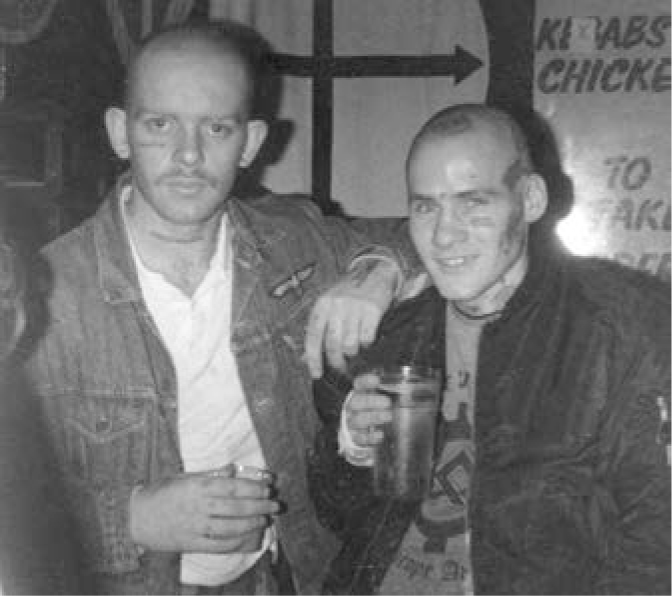
Two well-known Isle of Wight skinheads: Steve Smith on the left and Jason Bridle on the right (rest in peace)
Ian Stuart played for his cause. The money was secondary. The song also warns groups to think again before they succumb to the temptation of selling their soul to the left.
‘I Know What I Want’ brings the album to a close with another rousing call to arms, this time in the name of Europe.
Like Hail the New Dawn, Blood and Honour was made available through the National Front shop, Nationalist Books, at the cost of £5.50 including postage. National Front News urged readers to ‘buy the album to see why the system wants to silence Ian Stuart.’ With Pat Harrington, Derek Holland, John Field, Nationalist Books and Nick Griffin and his parents thanked on the back sleeve of Blood and Honour, Ian Stuart’s relationship with the National Front seemed as strong as ever.
Squadron and No Remorse
The early days of Squadron and No Remorse are remarkably similar. Both bands formed in 1985, broke up and reformed at a later date with a new line-up. Squadron was formed by three young skinheads from South East London.3636 The three founding members were Jim Harwood on vocals, Shok on bass and Rob on drums. Various guitarists were used but none were dedicated enough and although several songs were written, such as ‘Master Breed,’ ‘Robert Bassey,’ ‘Ripper,’ ‘Slags,’ ‘Skinheads ’85’ and ‘Law and Order,’ the band disbanded.
No Remorse was formed by guitarist Mark and bass player Paul from South London, recruiting Jason on vocals and Stew on drums. Jason had previously sung with Kent-based nationalist band Razor Sharp, who had split up because of ideological differences: remarkably three members of the band became communists! [Two of the three even went on to form a communist band by the name of Rhythm Method.]
No Remorse, who once declared ‘We are proud to be British and proud to be White,’ wrote songs such as ‘This Time the World,’ ‘Join Up Join In,’ ‘Child Molester’ and ‘Sunday Blood Sunday.’ They also practised songs by Jason’s former band Razor Sharp, notably ‘Ten by Ten’ and ‘What Do They Know.’3737 This patriotic band hoped to gig, but broke up because they ‘were not dedicated enough to get anything done.’3838
Prime Suspects
Brothers Danny and Spike from Reading in Berkshire formed Prime Suspects in 1985 ‘just for something to do.’3939 The original line-up was Danny on vocals, Spike on bass, Richie on guitar and Beaker on drums, but Beaker, otherwise known as Tony Tompkins, left to join Brutal Attack. With a new line-up of Danny on vocals, Spike on bass, Gordon on lead guitar and Craig on drums, the band eventually started to take itself more seriously. Gordon was not a skinhead:
I was a punk in the late ’70s and early ’80s, but always had right-wing views. Hence I fell out with the many lefties there and drank and hung out with the skins. Back then many of the pubs in Reading such as the Jolly Porter, the Britannia, the Osbourne Arms and the Beehive were full of NF and BM members. The Reading skinheads would have numbered around 80–100, and many punks were right-wing too. I never felt I had to be a skin to have nationalist views back then, still don’t now, to me it’s always been a belief and attitude, not a dress code. I knew Danny and Spike quite well from drinking in the same pubs in and around Reading. They approached me to join Prime Suspects because they said I had the right attitude politically. I had not played in a band before Prime Suspects, but had jammed with a few. I just didn’t want to join them.
The band was named Prime Suspects because ‘most of us were being lifted and hassled by the police at the time,’ explained Gordon. The band wrote a song about this period called ‘Get Out’ which started: ‘Everywhere we go we get pushed around…’ Politically, Danny and Spike were paid-up members of the National Front. Interestingly, Danny claimed that he and his brother Spike had been in and out of nationalist bands since 1978! Gigs followed. Prime Suspects played two RAC festivals staged in Suffolk, 1985 and 1986. Gordon had this to say about the festivals in general:
They were a great experience. So many like-minded people all bonded by the music. I met some good folk, many of whom I’m still friends with today. If only the people behind the scenes were as straight with the bands! But there was a lot going on that we and the other bands weren’t happy with. There were many great bands that stood out at the two festivals, Indecent Exposure, Brutal Attack, and, of course, Skrewdriver who always played a great set. Some of the lesser-known bands were very good too. I would say that back then there weren’t many bad ones. It’s just that some sort of lost sight of the goal, a pity.
Indecent Exposure — Reveal All LP
Towards the end of the year, Indecent Exposure continued their rollercoaster ride with the release of their long-awaited debut LP entitled Reveal All! on Rock-O-Rama Records (catalogue number RRR 54). The choice of album title may have been clever, but the record sleeve is remarkably uninspired. The band was still Steve ‘Milky’ Reeve on vocals, Graham Bacon on guitar, Tom Brennan on bass and Sedge Swatton on drums.
This album really does deliver the goods on so many different levels, from the top-notch and crisp production courtesy of Mark Sutherland, to the high energy and catchy tunes, from the sing-along choruses to the over-the-top guitar solos that drop in unexpectedly during some songs. This was definitely one skinhead band that had full mastery of its chosen instruments of expression. And yet Milky and the band were not happy with the final product:
I believe the album was hijacked. The album was recorded at Mark Sutherland’s studio at the same time as Skrewdriver were recording Hail the New Dawn. The version released did not sound like the mixed version to us. The sound is really low and flat. I contacted Herbert at Rock-O-Rama Records and asked him not to release it so that we could remix it. He said no because it had already been pressed. We sent nothing to Rock-O-Rama. It all went through Mark Sutherland. So it must have had something to do with him. After that, we did not trust Mark Sutherland and that’s why we used a different studio to record the second album.
Regarding the lyrics, mostly written by Tom and Sedge, only one song, ‘Rocking the Reds,’ places Indecent Exposure firmly in the RAC camp, with the chorus:
I can almost hear them coming
I can almost see them coming
Rocking the reds, rocking the reds
Only we can stop them rising
Only we can win by fighting
Rocking the reds, rocking the reds
The last verse also contains the line ‘Don’t be fooled by the communist call.’
Three other songs, ‘I Won’t Let My Country Die,’ ‘Save the Nation’ and the anthem ‘England My England,’ which were all written by Sedge, are patriotic, perhaps nationalistic, but not far-right and not national socialist. Sedge Swatton remarked: ‘One thing I am proud of is being English. I would never deny that. Am I a nationalist? To a degree, yes I suppose I am. Nazi I am definitely not. I have three generations of military in my family, some of whom fought and lost their lives against the Nazis, so the very last thing I am is a nazi or a sympathiser. Racist I am not. I was brought up in London and have friends of different backgrounds, black/mixed race and an Iranian neighbour. They have the same feelings and worries that I do. We didn’t affiliate or speak for any party or organisation, we just talked about things that pissed us off.’ Similarly, Milky insists: ‘My grandfather would turn in his grave if he thought I was a Nazi.’ The remaining songs, drawn from personal experience, are non-political. For example, ‘A Way of Life’ is about skinheads, their realities, their fashions, their rites, their rituals, their hopes and their pride:
Who’s that standing over there?
Great big boots and short cropped hair
They see us in the town they stand and stare
We’re the same as you but we don’t care
We’re skinheads and we’re proud of it
Me boss has a go but I don’t give a shit
We’re skinheads and we’ll stay that way
We’re skinheads and we’re here to stay
We like to have a laugh and have some fun
We like it down Southend when we’re on the run
We like to go to gigs and to hang down the town
But there’s always someone trying to put us down
We’re a dying breed but we’re not going down
No thanks to the people who let us down
We’re not like other cult fashions that come and go
We’ll always be around and we’ll let you know
‘The Fool’ is about the self-destructive lifestyle of glue-sniffing and was not written with any particular person in mind:
You liked to take some days off of school
But you weren’t happy with just one or two
It had to be weeks and weeks for you
Then you found you liked the smell of glue
You’re just a fool who never went to school
And now you’re standing small with your back against the wall
You’re a stupid, senseless, drugged-up, bloody fool
You thought you were funny when you broke the law
You smashed the window on a lady’s door
When the bill caught you, you were so sore
You got even by smashing it even more
Now that your life is in a mess
You had to copy all the rest
But now you’ve gone and lost your head
It won’t be long before your brain is dead
‘Shitter,’ a rather surprising choice of song title given the Cockney Rejects song of the same name which appeared on the Greatest Hits Vol. 1 album years before, was written with one particular person in mind. Sedge Swatton was not prepared to say who, but Milky was: ‘The song was about somebody called Mark. On one particular occasion he was having his hair cut and boasting about fighting down Southend which ended with his arrest, but he was never there! The story got back to us. We made sure he regretted his words. He could not hold his head up for a long time after.’ The lyrics to the song are:
You talk loud when there’s nothing going on
You act so hard and easy
But the moment there’s trouble
You’re nowhere to be seen
Some mate you turned out to be
You’re a shitter - you let us down
You’re a shitter - we don’t want you around
You’re a shitter - you’re no mate of mine
You’re a shitter - you’ve run out of time
You start it when the trouble boils
You always leave the scene
You’re never there to share the glory
But always there to tell the story
The next time you’re in trouble mate
I’ll think about the help you gave
And you’ll be stuck with a little luck
And then you won’t act so brave
This LP was not widely available in the UK and does not seem to have been kept in print for long by Rock-O-Rama Records like many other titles. Sedge Swatton would later complain: ‘I’ve never seen any royalties ever and I don’t think the label did a lot for us.’ Then again Sedge Swatton admits: ‘We were very young and naïve when we got the record deal which was a big thing for us.’ Milky, for his part, recalls that the band received 25 copies of the album from Rock-O-Rama Records, which were cheaply sold on for something like three quid each. Besides the albums, he agrees with Sedge: ‘We received no royalties. Not a single penny! We did not do it for the money, but we expected to get paid what we were due.’
Returning once again to the question of politics, many argue that Indecent Exposure are guilty by association; indeed, they shared the stage with the likes of Skrewdriver and Brutal Attack, they shared the same vinyl space unwittingly as Skrewdriver and the bass player wore a Skrewdriver T-shirt when they played Suffolk. Moreover, the rewritten lyrics to ‘England My England’ do go well beyond a comfortable sense of patriotism. However, the band has argued in its defence:
The RAC scene for us was just a way of getting gigs. As far as we were concerned it was Rock Against Communism, which the song ‘Rocking the Reds’ is about, but what we didn’t know beforehand was that it was heavily influenced by the NF. When we tried to move on and get our own gigs we were victimised by the right and already labelled by the left which left us very little option but to call time on the band. We took a wrong road and it came back and bit us. The RAC label has stuck with us but we did much more than that. We also played with King Kurt, Bad Manners, Desmond Dekker and the Business amongst others which never seems to get mentioned, only Skrewdriver.
In response, for a patriotic band that only wanted to play Oi music without the interference of extremists from the left and the right, some of the choices they made were extremely naïve. Asked if he would change anything about his time with Indecent Exposure, Sedge Swatton responded: ‘I would have tried to avoid the RAC gigs as it just caused us problems and eventually split the band up… It still comes back to haunt us even though it was over 30 years ago.’ Even so, Sedge Swatton has no regrets: ‘I don’t regret anything cos it makes you what you are and gives you experiences. Despite the RAC links a lot of people still regard Indecent Exposure as one of the best Oi bands around at that time so that I am proud of.’
The left and the right were unforgiving. Milky recalls with disgust: ‘Boz of English Rose fanzine called the band commies and Jews and stated he wanted to kill my grandparents and make lampshades out of their skin. We were incensed. Not long after we went to see Sham 69 in London and he was in the queue. He must have spotted us first or been told that we were around because he disappeared sharpish. We would have killed him if we had got hold of him.’ Then there was the time Alan Drury, the Luton and Dunstable NF organiser, had a pop at Milky at a RSG (scooter) night at Queensway Hall, Dunstable. [The year was 1985 or 1986.4040] Milky was not one to turn the other cheek. An eyewitness still recalls the subsequent fight all these years later because the two of them accidentally landed on the legs of a lad he knew who had just been released from hospital after an operation on his knee!4141
Like Sedge Swatton, Milky has no regrets: ‘We did what we did because they were the only gigs available at the time. A gig was a gig. The politics never bothered us. We were us. We did what the fuck we wanted… No one liked the fact we did that and every one hated us for it and I still don’t give a fuck cos that’s what being a skinhead was all about… doing what the fuck you wanted and nothing else.’
On Saturday, 14 December, Skullhead and Brutal Attack played a ‘Northern White Christmas gig’ in Newcastle. Skrewdriver would have headlined this gig if Ian Stuart was not behind bars. Nevertheless, Kev Turner of Skullhead recalls this Northern White Christmas concert as particularly memorable; not only did it represent a turning point for the band but it also had one of the best atmospheres he had ever known at a gig.

Public Enemy
Also on Saturday, 14 December, Public Enemy, the Diehards and Vicious Rumours played the King William IV pub in Greenwich, South East London. Public Enemy debuted a new line-up of Paul Burnley on vocals, Dal Mumford on guitar, Richard ‘Worz’ Worsdell on bass and Martin on drums. Paul Burnley [real name Bellany] of National Socialist-oriented Kent-based fanzine The Truth at Last and later of No Remorse ‘fame,’ who had championed Public Enemy in the pages of his fanzine, had joined the band as ‘second singer’ around the time they were recording their England’s Glory LP. Paul was pictured and thanked on the LP, but he did not sing on it. Soon afterwards, Dal, who wanted to concentrate on guitar, asked Paul to take over as lead vocalist. The band had chosen Paul over Vinnie Bamford who produced the Reading-based skinhead/Oi fanzine England’s Glory.
Gilly of fanzine Red, White and Blue was on hand at the King William IV pub in Greenwich to review proceedings: ‘First on were the boys from Maidstone, Public Enemy. Dal was pissed right up, after going to a friend’s wedding; also it was Paul’s, their new lead singer’s first gig. The first song was of course ‘Pervert,’ a brilliant track and got the crowd going, and the two best songs they did on the night were ‘Strength Through Oi’ and ‘Win or Die.’ The crowd seem to know ‘Disco Nightmare’ after being on No Surrender, [which was] not as good as normal, but we had a good laugh and that’s what it’s all about.’
Skrewdriver, Brutal Attack and Public Enemy were due to play a RAC White Christmas concert in London on Saturday, 21 December. The redirection point was advertised as London Bridge Underground ticket office. With Ian Stuart behind bars, many thought the concert was cancelled and stayed away, but it actually went ahead with Brutal Attack and the Diehards. The venue was a church hall.4242 One person who attended this concert thought it ‘funny as fuck’ to see the vicar in the entrance hall where band merchandise and other goods of a certain political persuasion were on sale!

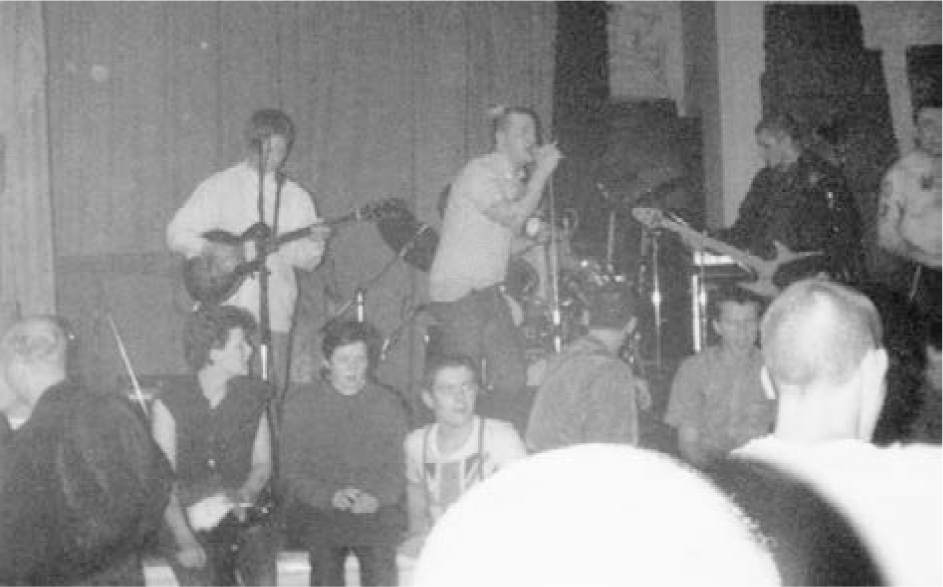
The Diehards, London RAC White Christmas concert 1985
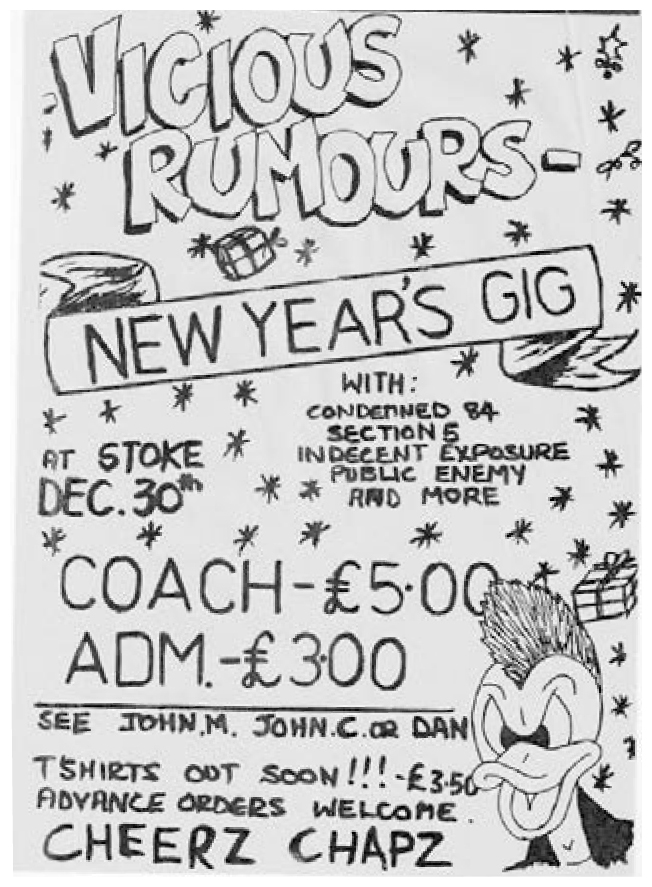
On Monday, 30 December 1985, Indecent Exposure, Public Enemy, Skullhead, Intensive Care, Condemned 84 and Section 5 were billed to play Roxy Roller, Stoke-on-Trent. The bands that played were Vicious Rumours, Public Enemy, Intensive Care, Condemned 84 and Section 5. Gilly and Dave of fanzine Red, White and Blue, who had made the long trip from Kent to be at the gig, reviewed Public Enemy’s performance thus:4343 ‘Public Enemy jumped on pissed up again and I must admit new singer Paul is coming on and learning more and more. ‘Strength Through Oi,’ their new single, went down well (as always) and considering the bar had just reopened they had a good reception.’ At the end, all of the bands got on stage and did an encore of ‘I’m Dreaming of a White Christmas’!
![]()
1. Skinhead Arrival no. 1, 1985.
2. The television crew can be seen on stage in photos of the Skrewdriver performance.
3. The exact date of these recordings is not known, but is likely to be early 1985.
4. Ibid.
5. The suggestion has been made that Above the Ruins were active while Wakeford was still with Death in June. The author is not convinced of this. Busy with Death in June, Wakeford was surprised by his sacking. The simple reason is that he wrote more than his fair share of material for the group, whose output was hardly prolific to begin with. Nevertheless, the distinct possibility exists that during his time with Death in June he may have written material which was later used for Above the Ruins. In fact, he may have used for Above the Ruins material he had written for Death in June, which had been rejected.
6. Poems ‘Roses’ and ‘Crosses’ are found within the theme of War in the booklet. Comben wrote about the War poems: ‘They express my despair at the wasted sacrifice of the Great War and my belief that much of our recent unhappy history has its origins in that catastrophe.’
7. Nationalism Today #27, 1985.
8. An ad placed by the Nationalist Shop in New Dawn no. 2, dating from late 1985, announces the news that the tape is ‘soon to be available on record.’
9. The review of the Above the Ruins demo in fanzine English Rose no. 3 appears to be the source of the rumour that Patrick Harrington was a member of the band. Boz who did English Rose has since clarified that ‘the review was not to imply that Harrington was in the band.’ [Research provided by Carl Booth.] If anything, the English Rose review suggests that Patrick Harrington was the band’s manager, which is more plausible.
10. New Dawn no. 2, late 1985.
11. Defendant Tapes, operating out of a P.O. box in Huntingdon, released a tape by Final Sound called ‘Play to Win.’ The author has not been able to locate a copy of said tape.
12. Ibid.
13. Ian Stuart claims that they were attacked by about ‘eight or nine’ or ‘about ten’ blacks (fanzines Boots ‘n’ Braces and White Noise no. 1 respectively). The possibility exists that the three blacks who started the fight were joined by others.
14. Interview with Ian Stuart, fanzine White Noise no. 1.
15. Milky reckons the number was nearer 1000.
16. Indecent Exposure played the RAC festival twice. Milky cannot remember the exact year this happened. The author has assumed it was 1985 which is not well documented. The review of the 1984 festival in This Is White Noise is quite specific about the running order of the bands.
17. To clarify, Skrewdriver have often been depicted as ‘special guests,’ which was not the case.
18. The Savoy Ballroom is now called the Dome.
19. Date and venue unconfirmed. Indecent Exposure definitely played with the UK Subs in Cardiff in 1985 but the date is not known. However, the UK Subs only played Cardiff just the once that year, which was on 3 October at Bogiez, but no mention is made of the support band. (uksubstimeandmatter.net)
20. Date unconfirmed. The date of 19 December comes from a gig list prepared by Kev of Condemned 84 for Carl Booth, but there is no mention of Indecent Exposure playing. Curiously, the author has a Condemned 84 flyer listing the date as Saturday 23 November.
21. Postie Rob, who drove a minibus up to the gig, recalls an altogther different end to the night: ‘After the window of the military surplus store got smashed the police arrived. One copper got stabbed. And with that they returned mob-handed and in riot gear. Everyone was smacked with a truncheon on the way out of the venue.’
22. Venue unconfirmed. Indecent Exposure played Cardiff twice, once with the UK Subs and once with the Business and Vicious Rumours. Both gigs were at the same venue but, as stated earlier, the venue remains unconfirmed.
23. On Monday, 6 June 1988, Indecent Exposure played Uppsala, Sweden with Agent Bulldog, Dirlewanger and Vit Aggression. Milky remembers the day well because it was the National Day of Sweden, which is observed in Sweden on June 6 every year. Sedge Swatton recalls that ‘the local lefties tried to stop it’ (correspondence with Sedge Swatton, August 2012).
24. Interview with Jim of Society’s Rejects, fanzine Voice of Britain no. 4, 1986. Not to be confused with a Cardiff-based band of the same name who recorded for Oi! Records.
25. Fanzine Boots ‘n’ Braces, late 1986 or early 1987.
26. National Front News no. 74, 1986.
27. Pearce, The First Ten Years: Chapter 8.
28. Ibid.
29. Interview with Ian Stuart, fanzine The Truth at Last no. 9, late 1986
30. Pearce, The First Ten Years: Chapter 8.
31. Polish fanzine.
32. The murder of Lord Mountbatten by the terrorist IRA [‘A Lord is killed at Terrorist hands’] and the killing of 18 soldiers of the British Security Forces by the IRA at Warrenpoint, County Down, Northern Ireland [‘Soldiers killed in County Down’] would date the lyrics to 1979.
33. Pearce, The First Ten Years: Chapter 8.
34. Interview with Ian Stuart, Australian fanzine The Storm Troop no. 1, 1987.
35. Interview with Ian Stuart, fanzine The Truth at Last no. 9, late 1986.
36. According to the interview with Squadron in British Oi no. 16, ‘the name Squadron was picked out of a dictionary with a pin in 1985.’ However, according to a second source, all three founding members were from a South London skinhead gang called ‘Squadron skinheads,’ which inspired the band name Squadron.
37. Swedish fanzine Streetfight no. 2, 1986.
38. Interview with Paul Burnley of No Remorse, fanzine Short and Sharp no. 2.
39. Interview with Danny of Prime Suspects, fanzine Blood and Honour no. 3, circa 1987.
40. There was definitely a RSG night at Queensway Hall in 1985. The author does not know if a similar event was held at the same venue in 1986.
41. Milky does not recall this fight, but that is not to say it did not happen.
42. The venue is not known to the author but the following year the same redirection point was used for the St. George’s Day concert and that concert was held in St. George Church hall.
43. Review of Stoke gig, fanzine Red, White and Blue no. 1.